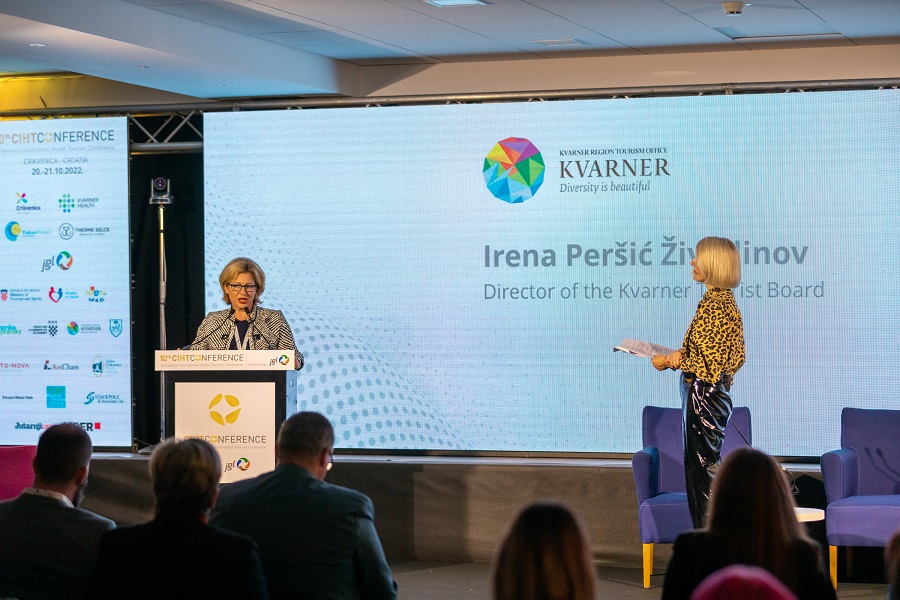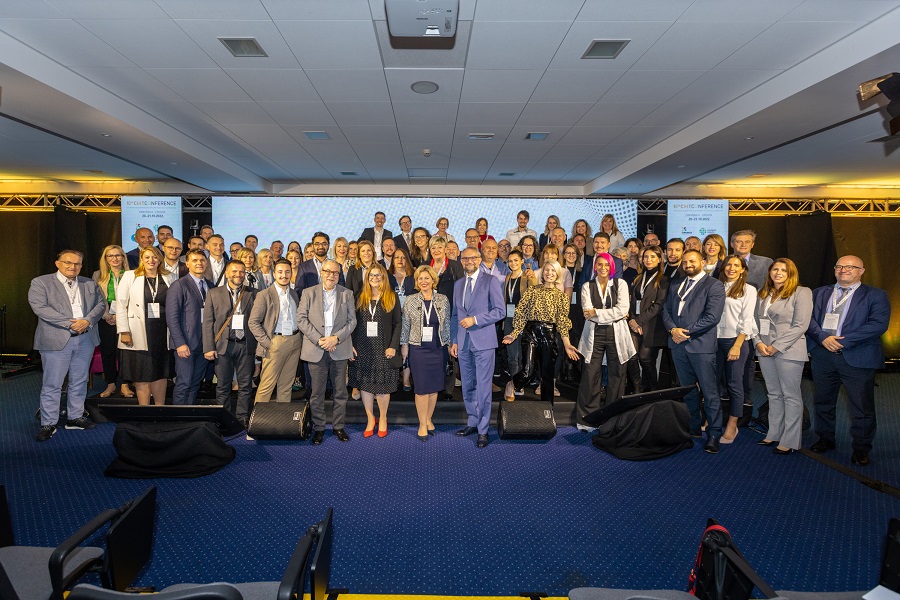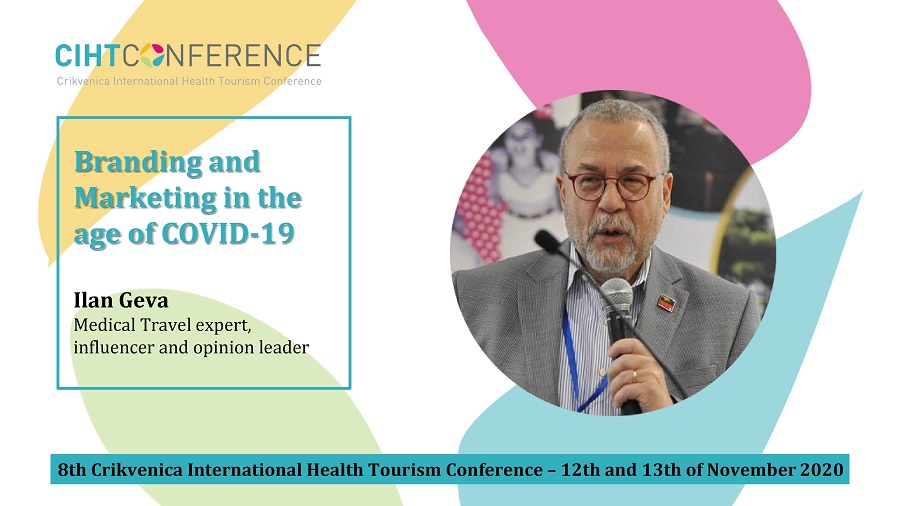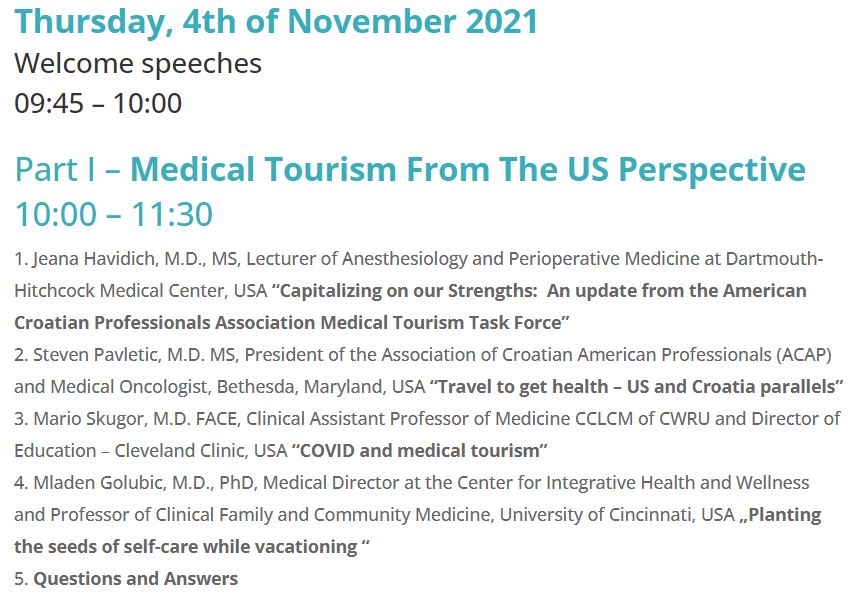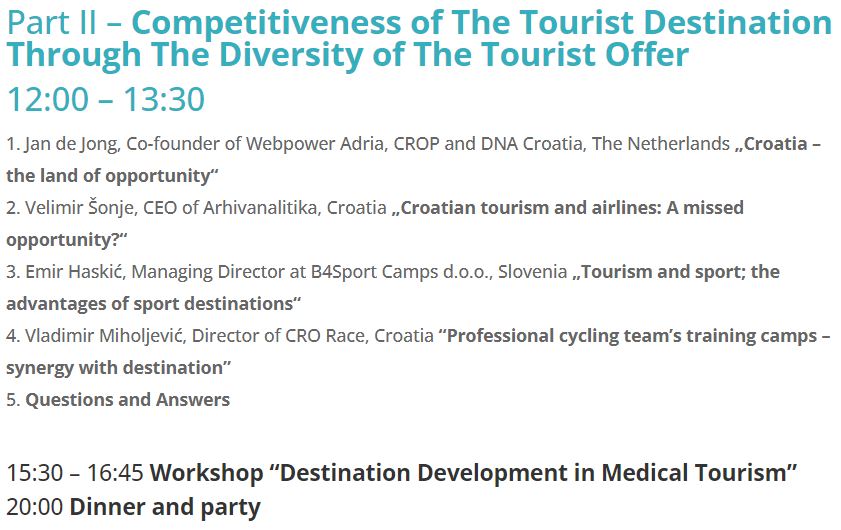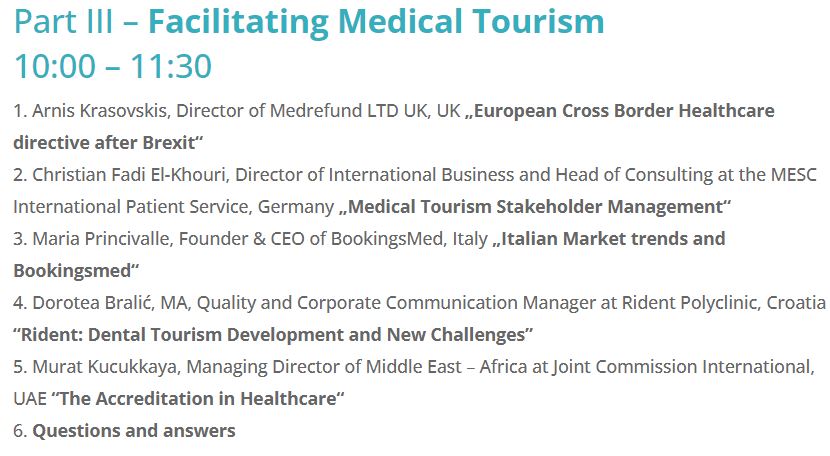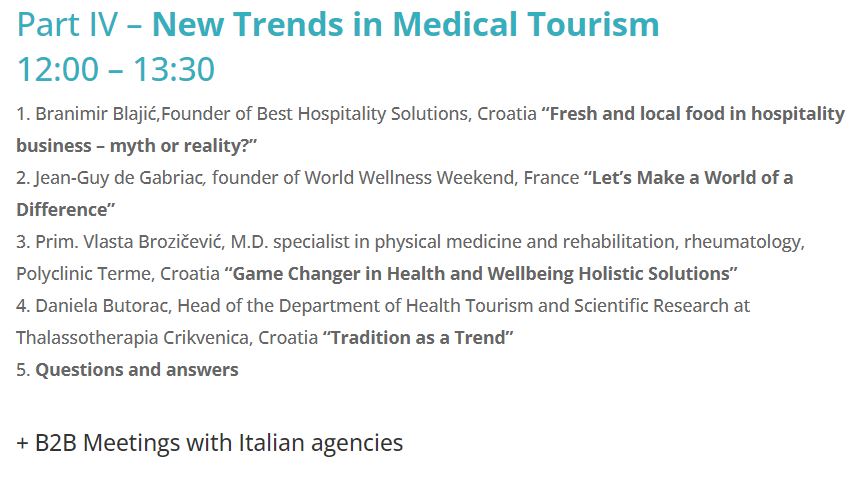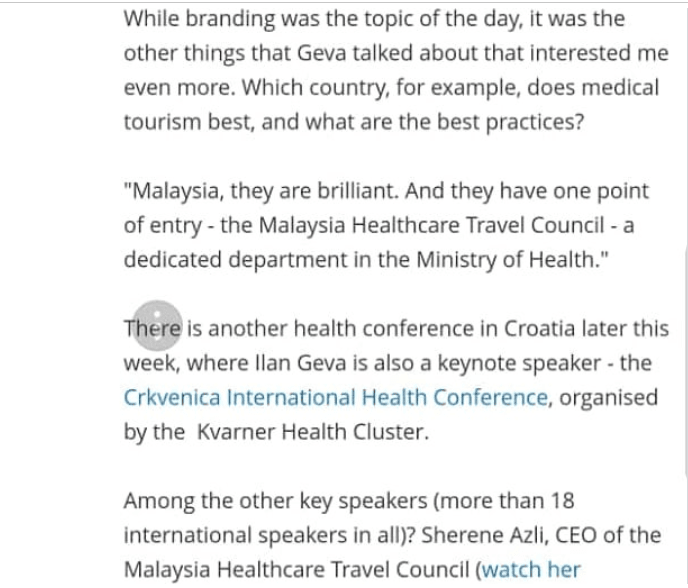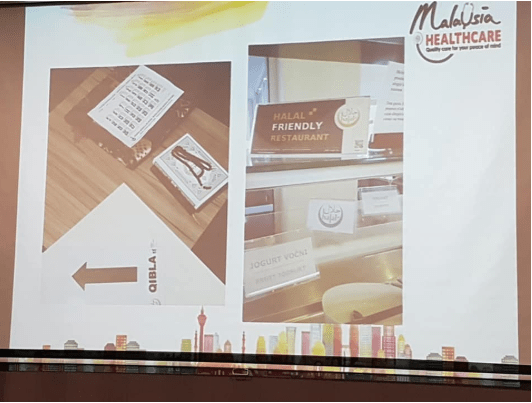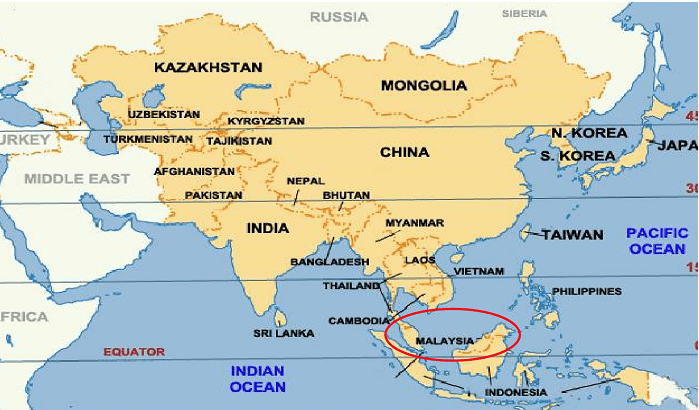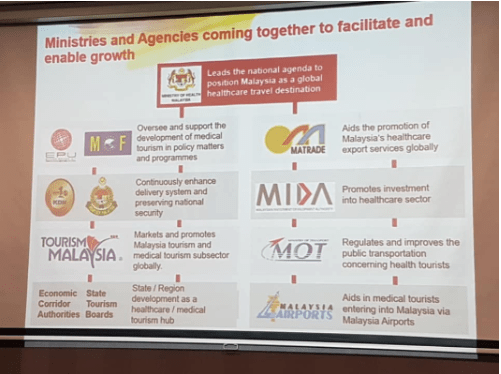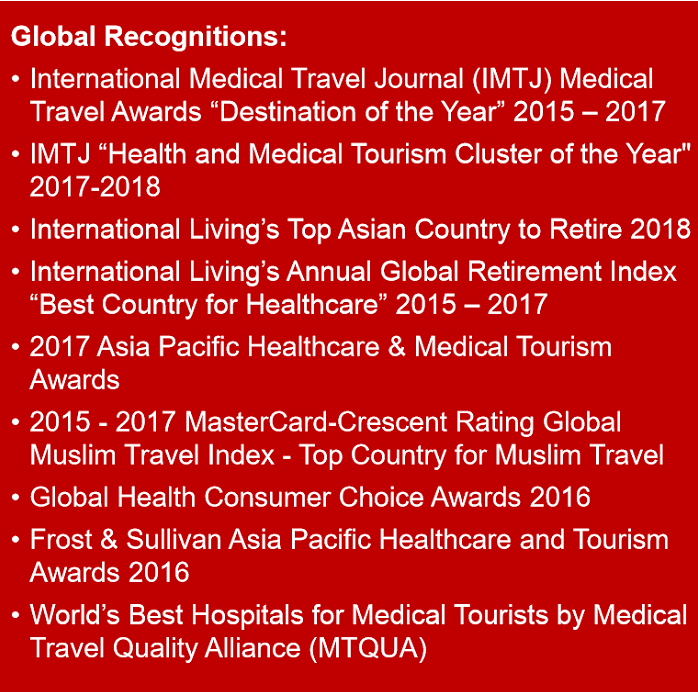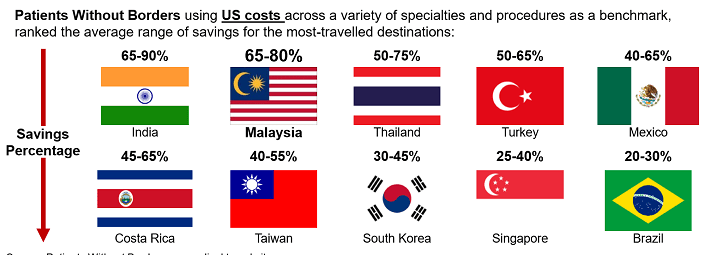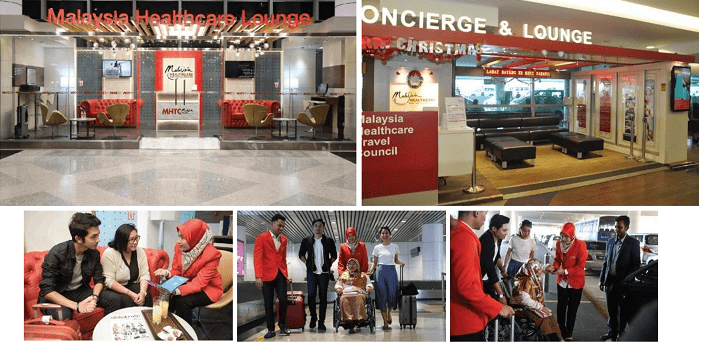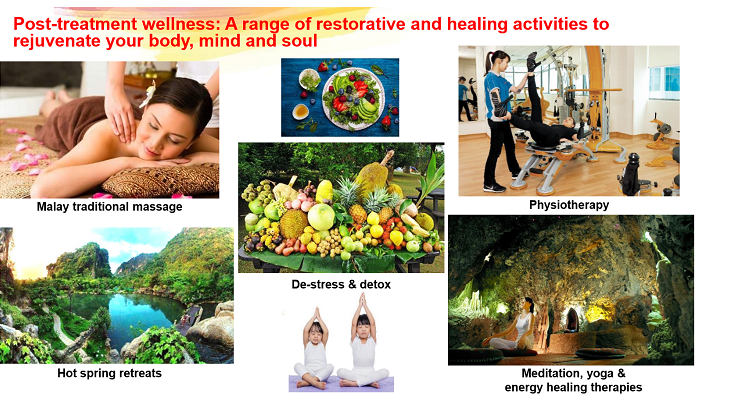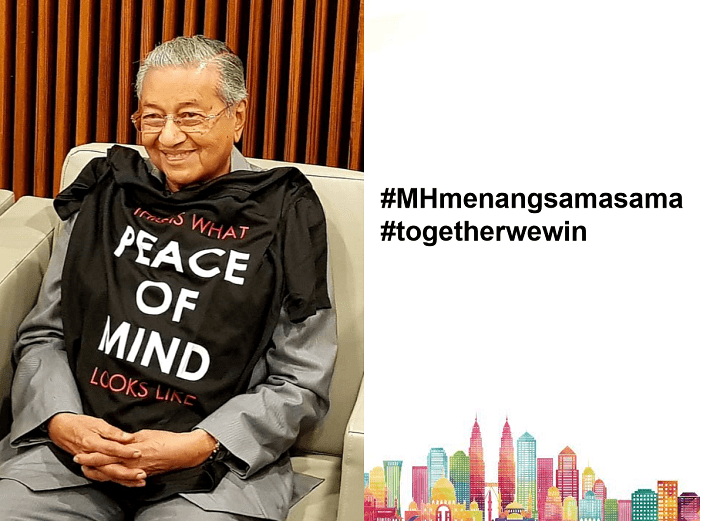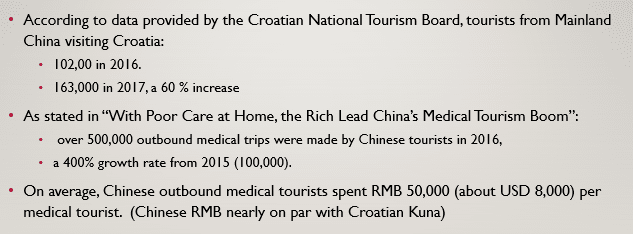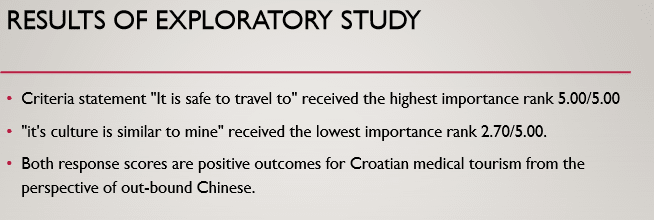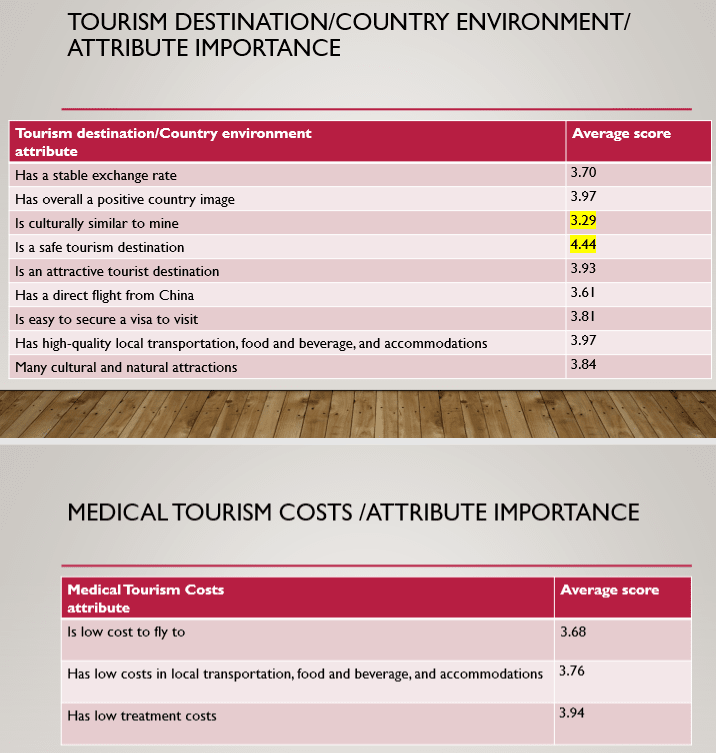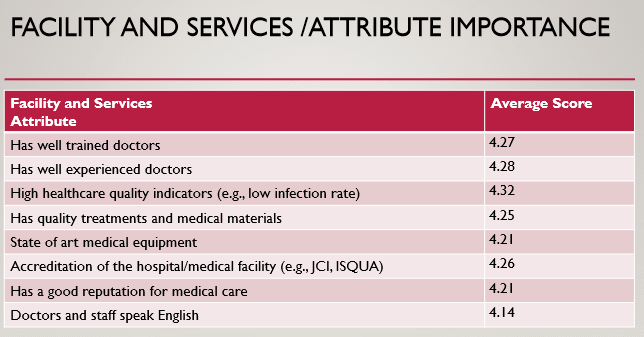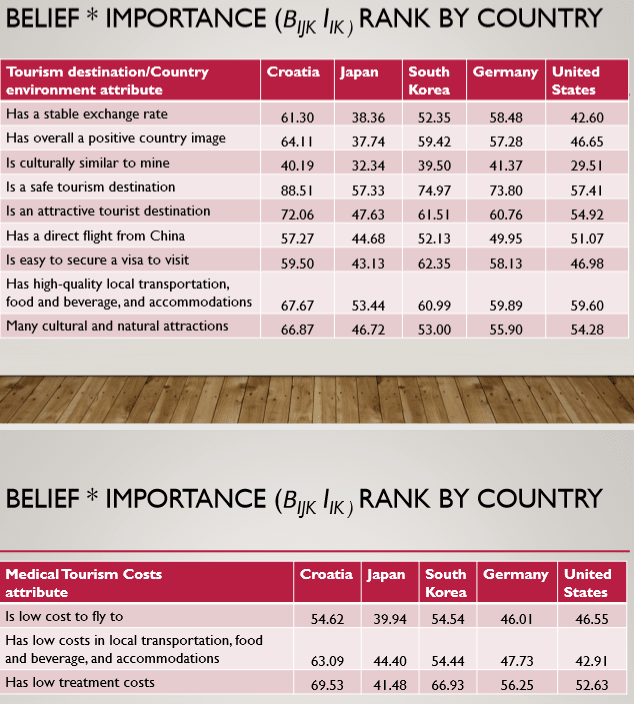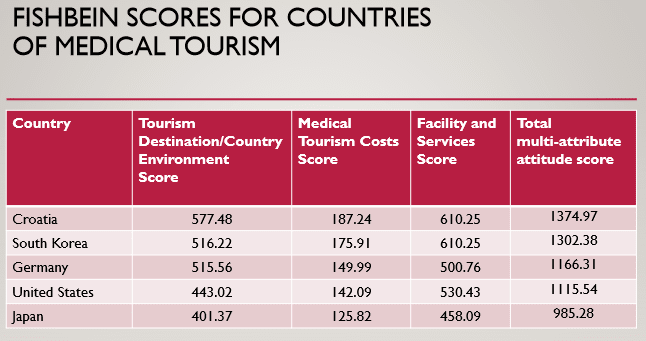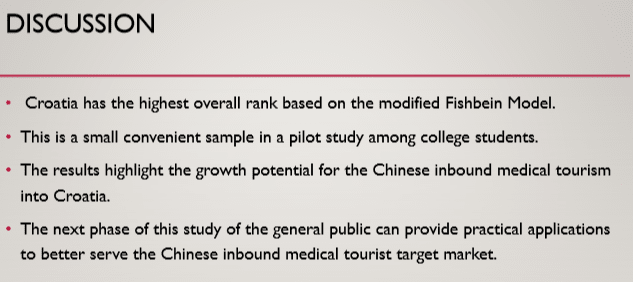Vladimir Mozetic, Kvarner Health Tourism Cluster President on Croatian Medical Tourism
November 7, 2022 - Croatian medical tourism is back after the pandemic. TCN catches up with Kvarner Health Tourism Cluster Vladimir Mozetic after the successful 10th edition of the Crikvenica
The 10th CIHT conference is behind you, congratulations. Give us an overview of this year's event. What were the highlights for you?
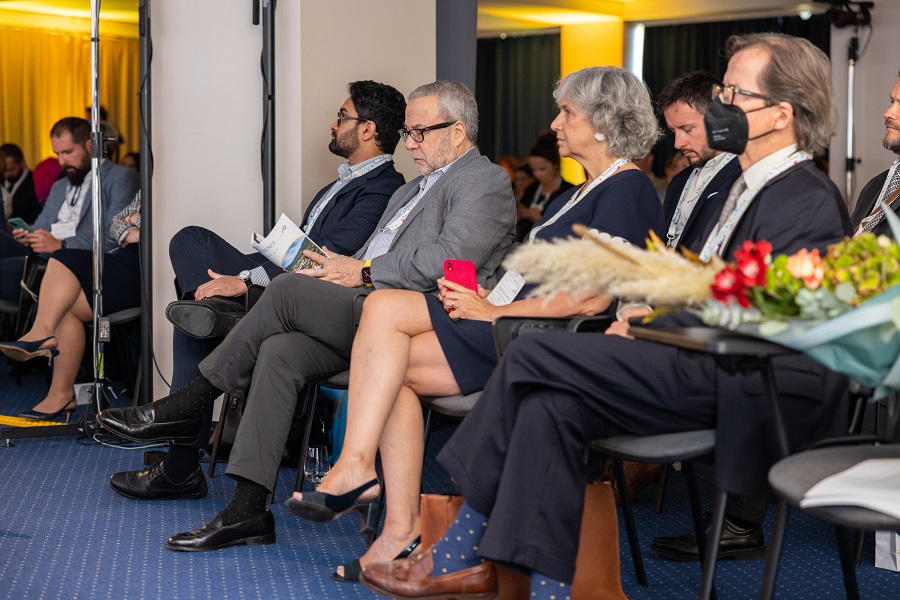
At this year's jubilee 10th CIHT Conference, over 120 participants were on the location, and over 300 participants attended online. During the Conference, over 20 eminent experts from the USA, UAE, Germany, Poland, and Croatia took part in presentations, workshops and panels. The titles of the panels and workshops speak for themselves:
New, Newer and the Newest in Health Tourism,
Health and Health Industry: Investment and Development,
Medical Tourism and Patient Expectations,
Natural Healing Factors and Health Tourism
Health tourism and sports rehabilitation
Workshop I – Careers in Health Travel
Workshop II – Accessible Tourism
Workshop III - Plan for the promotion of Croatian health tourism on the US market 2023-2025
During the Conference, we also presented 13 awards in recognition of personal/institutional contribution to the development of health tourism in Croatia. The winners were:
1. Special Hospital for Orthopaedic Surgery Akromion
2. University Eye Hospital Svjetlost
3. Glavić Clinic
4. Special Hospital for Medical Rehabilitation Krapinske Toplice
5. Special Hospital for Medical Rehabilitation Stubičke Toplice
6. St. Catherine Specialty Hospital
7. Special Hospital dr. Nemec
8. Rident Dental Clinics
9. Thalassotherapia Opatija
10. Therme Selce
11. Thalassotherapia Crikvenica
12. Ognjen Bagatin
13. Marcel Medak
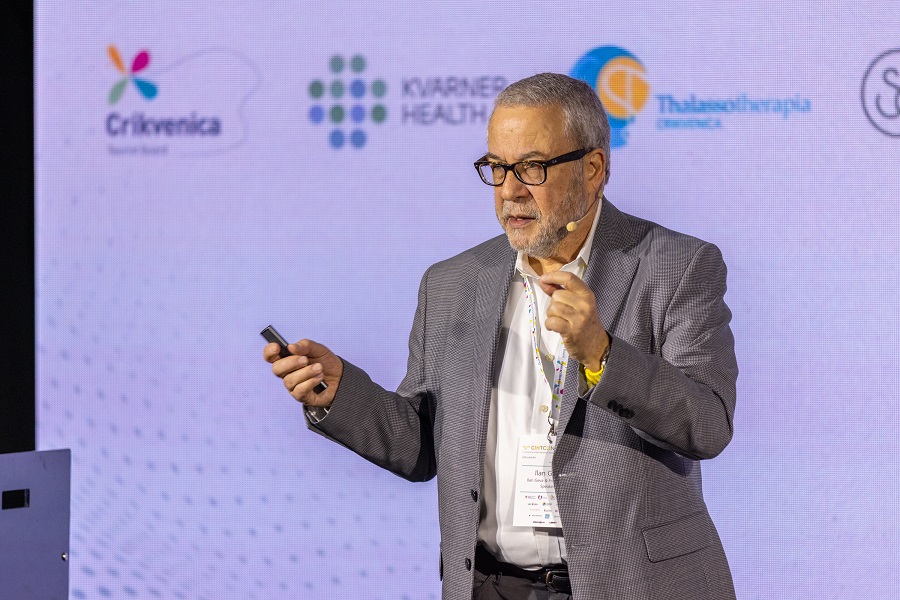
Ten years is quite an achievement, and both CIHT and Kvarner Health Tourism Cluster have made considerable progress since 2013, when you started this conference. Reflect on the last decade. Are you happy with progress so far?
I am certainly satisfied with the direction of the development of the Conference, which over the years has established itself as one of the most significant conferences in the region in the field of health tourism.
CIHT Conference was held for the first time in 2013 on the occasion of marking 125 years of organized health tourism on the Crikvenica Riviera, and in 2015 Kvarner Health Tourism Cluster joined as the organizer, alongside the Crikvenica Tourist Board.
Currently, CIHT Conference is the result of cooperation between the Crikvenica Tourist Board and the Kvarner Health Tourism Cluster as organizers, and the Special Hospital for Medical Rehabilitation Thalassotherapia Crikvenica and the Terme Selce Polyclinic as co-organizers. This year as well, the general sponsor was Jadran-galenski laboratorij d.d., the largest Croatian pharmaceutical company with global success and a member of the Cluster.
Also, for many years, both the Ministry of Tourism and Sports and the Ministry of Health have supported the CIHT Conference, as well as the Primorje-Gorski Kotar County, the Croatian National Tourist Board, the Kvarner Region Tourist Board, the Croatian Chamber of Economy, and the City of Crikvenica.
With the development in the past 10 years, experts from about 20 countries from 4 continents have participated as speakers at the Conference, bringing new knowledge and trends every year both in the organization and content of the service program in health tourism. The importance and possibilities of using new technologies in the provision and promotion of services, as well as the role of accreditation and certification, were also highlighted. A special area is dedicated to presenting knowledge about investment opportunities in health tourism, as well as the scientific segment of the CIHT program.
In addition to the exchange of knowledge, a very important area in the development of the Conference was the creation and maintenance of a "network", which also enables the continuation of business cooperation. This was also confirmed to us through a large number of active projects between the participants.
Of course, a non-negligible part of the Conference is getting to know the tourist / cultural / gastronomic / oenological qualities of our region.
Where was Croatian health tourism back then, and where is it today?
Given that in the past period, legislative changes were made at the national level and health tourism was included in national and regional strategic plans, the gradual development is obvious. Health tourism has been designated as one of the guidelines for the development of tourism, and at the same time it has become an integral organizational part within the field of health. Also, investments in personnel, space and equipment, as well as marketing and sales, have made it possible to talk about health tourism as one of the most significant economic branches in active development. At the same time, with the financing models offered through various EU programs, the necessary preconditions for further development are made possible.
The pandemic obviously severely disrupted the industry. How would you assess things now, and what permanent changes resulted from that disruption?
Certainly, the pandemic has slowed down the planned development, hitting some sectors more than others. At the same time, adaptation to the new situation led to new ideas, adaptation of the type of services to the new situation and greater use of technology in communication with users (digitalization, mobile applications, telemedicine). The way institutions and services are advertised has also partially changed. Auto destinations and shorter air destinations without major transfers are a more acceptable choice at the moment. As expected, the pandemic contributed to additional investments in the health industry, through research and products in the preventive, diagnostic and therapeutic segment.
What the members of our Cluster offer is a large number of POST-COVID rehabilitation programs, which are offered to both the domestic and foreign markets. At the same time, the offer is adjusted and developed in accordance with the trends in preventive and personalized medicine, physical and mental rehabilitation, the so-called "lifestyle" medicine, i.e. medicine of the style of life, and active and healthy aging programs. Although our focus is primarily on the surrounding countries (76 million people live within a 500 km or 5-hour drive, of which 15 million are over 60 years old), we also direct our advertising towards Scandinavia, Great Britain, but also the US, the UAE, India, and integration of various service models depending on the market. Research shows that for now about 50 million EU residents use health services outside their home country (about 10%), while about 250 million (53%) of those who wish to do so would, and this is an indication that there is no shortage of markets.
You have done a fantastic job branding Kvarner as a health tourism destination, and the Kvarner brand is bigger than Croatia within the industry. What is Kvarner doing differently?
I believe that the main reason is that in the Kvarner Region and in the entire county, and based on a tradition of over 180 years, we realized in a timely manner that mutual association of participants in health tourism (health, health industry, tourism, science and education) can bring greater visibility and better organization to everyone, a more economical approach and long-term investment. At the same time, each of the members additionally develops and uses its comparative advantages. For many years, most institutions have been continuously investing significant funds in staff, equipment and premises, as well as in the promotion of their own services on markets. Top quality service at an optimal price, and excellent transport connections by land and air are the main reasons for competitiveness. We provide an offer that includes the organization of the arrival, accommodation, health services, but also local cultural, gastronomic and "outdoor" activities. It is important to note that the health industry, of which health tourism is a significant part, is positioned as one of the strategic economic branches of development in our region. It also contributes to the quality of life of citizens, and creates products that can be offered to the market.
The Kvarner health tourism cluster (www.kvarnerhealth.hr) is an independent association (NGO) founded in November of 2014. It brings together members from the health sector (medical and dental), the health industry (pharmaceutical company), the tourism sector (tourist associations, agencies, hotel groups) and the scientific and teaching field (faculties of the University of Rijeka). Currently, the Cluster has 37 members, with over 9,500 employees, of which almost 5,500 are health personnel. The members are from both the private and the public sector.
Of course, we have high-quality cooperation with partners from all over Croatia, as well as state, regional and local institutions. We are also aware that additional connection is needed at the national level and we wish for this to happen as soon as possible, as this will achieve additional competitiveness and quality, both on the European and global markets.
Your priorities over the next 2-3 years to develop health tourism in Kvarner and Croatia?
The first step that we need to achieve at the national level is to turn from talking about potentials in health tourism to the realization of these common potentials. Legislation has been created that enables this, strategies have been written, and sources of financing are visible. If we jointly accept the health industry as a strategic economic branch, if we connect stakeholders in health care, the health industry, tourism, science, education and research, we can expect successful results. Destination certification projects, destination management, accreditation of service providers, the use of public-private partnerships, joint application to EU projects, and the use of comparative advantages and opportunities of individual sub-regions of Croatia will enable us to achieve the desired results.
For those perhaps not so familiar with the Kvarner region as a health tourism destination, paint a picture for us. What range of services and excellence are on offer, and what other facilities can people enjoy?
We often use the saying that "A week of stay in the Kvarner Region means health for the whole year". The name Kvarner comes from the Latin word "Quaternarus", which means a region that has mountains and a hilly region (Gorski kotar) in the north, the Istrian peninsula in the west, a long sea coast in the east, and islands in the south. This geographical area creates a uniquely healthy microclimate, and in addition to the natural healing factors we have, they were recognized as early as the first half of the 19th century, when the first spas in Kvarner began to open.
We still use this "positional rent", in addition to high-quality health and tourism staff, investment in equipment and space, as well as research and education, as well as high-quality land and air traffic connections. This is complemented by a high-quality and healthy gastronomic offer of local foods, in accordance with modern nutritional guidelines, activities in nature, at the sea, along the coast and in the hilly part of the region. The offer also includes wellness programs, as well as modern and traditional cultural facilities. Come and get to know Kvarner.
You can learn more about the Kvarner Health Tourism Cluster on the official website.
Read more about CIHT - CIHT 2022: Croatia's Premier Health Tourism Conference Turns 10 in Style.
CIHT 2022: Croatia's Premier Health Tourism Conference Turns 10 in Style
November 2, 2022 - Kvarner cements its reputation as the de facto capital of the Croatian medical tourism story, as the Crikvenica International Health Tourism (CIHT) conference marks its 10th anniversary jubilee with yet another outstanding conference and list of participants.
There has been a lot of uncertainty in the world in the last decade, and tourism is no exception. But there is one corner of Croatian tourism, where things have remained fairly constant, growing every year and attracting global excellence from all corners of the planet.
It is 5 years since I discovered that Croatia even had a medical tourism industry of note, when Ognjen Bagatin introduced me to the excellent Zagreb trio of Poliklinika Bagatin, St Catherine's Specialty Hospital, and Svjetlost Eye Clinic, but while the Croatian capital had an impressive lineup of services, it did not take me long to realise that the centre of medical tourism excellence in Croatia lay on the coast in Kvarner, where a concentration of truly outstanding medical tourism experts - in a variety of fields, were offering some of the best - and most affordable medical tourism services in Europe, ably organised by the umbrella organisation, The Kvarner Health Tourism Cluster.
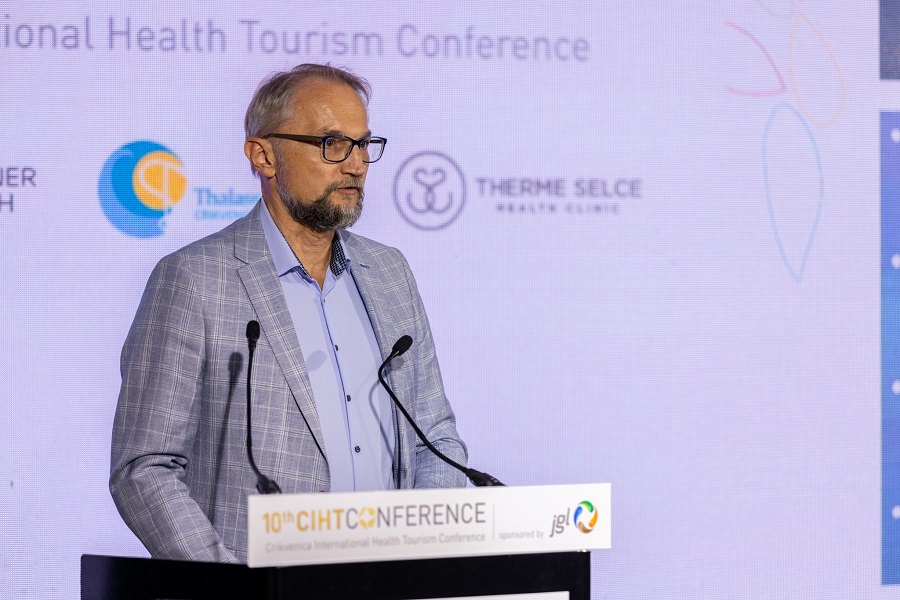
At the centre of those promotional efforts was a conference which started small back in 2013, went online during the pandemic, but last month celebrated its jubilee 10th anniversary firmly established as the leading health tourism conference in the region, with a truly outstanding list of international expert speakers. When I first attended the conference back in 2018, I was impressed by the number of medical tourism superstars with no obvious connection to Croatia who had made the journey to take part. These included Keith Pollard, Editor-in-Chief of the International Medical Travel Journal, and Sherine Azli, CEO of the Malaysia Healthcare Travel Council, voted the best medical tourism country in the world. Mayo Clinic, Cleveland Clinic and many other prestigious names have taken part over the years.
After the turbulence of the pandemic years, medical tourism in Croatia is back on track, largely due to the energy of the movers and shakers from Kvarner. An overview of this year's CIHT 2022 conference below. You can learn more about CIHT 2022 on the official website.
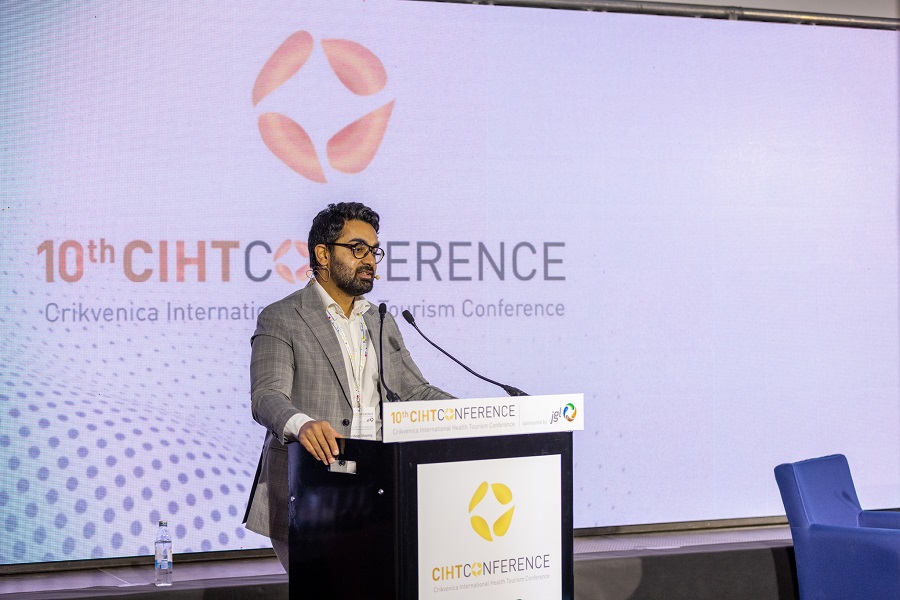
The jubilee 10th CIHT confirmed its reputation as a leading regional conference on health tourism
This year's jubilee 10th consecutive CIHT (Crikvenica International Health Tourism) conference, held on October 20 and 21 in a hybrid form, in Hotel Omorika and online, gathered in one place more than 20 lecturers from 7 countries and over 300 participants eager for new knowledge about the position, challenges, future and trends in health tourism. The growing attendance and interest in this conference speaks volumes about the importance of a strategic development plan for health tourism in order to better position Kvarner and Croatia on the map of health tourism destinations in the world.
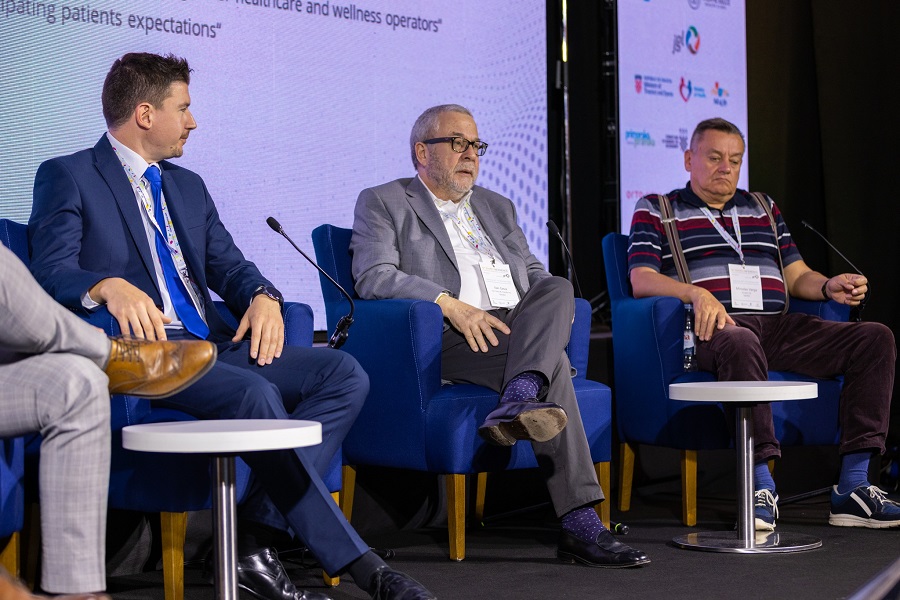
"The CIHT conference achieved its goal again this year - it gathered top experts from all over the world in the field of health tourism. About 120 participants gathered in Crikvenica live, and even more online. These two days were very interesting in terms of exchanging information, experiences and knowledge, and we will certainly all leave richer for some new knowledge that we will apply in practice. As for the future of the CIHT conference, we are already planning new ideas, speakers and topics, and I invite everyone to join us at the CIHT conference in 2023", said the director of the Tourist Board of the City of Crikvenica, Marijana Biondić.
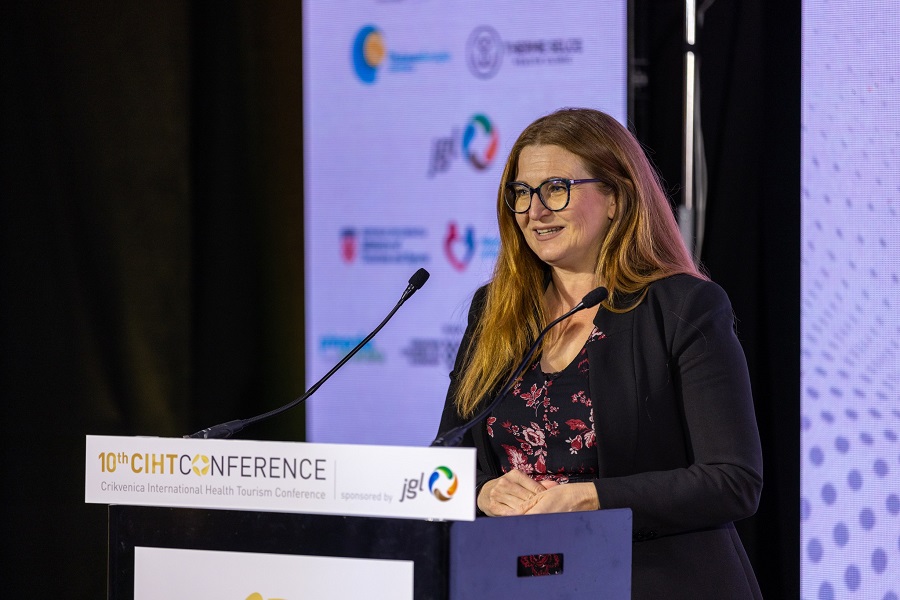
One of the special features of this conference is that it brings experts from different professions such as medicine, tourism, marketing and business, which gives a diverse and comprehensive perspective on this prosperous branch of tourism. The conference ideally connects the experiences of the public and private sectors, experts and representatives of health institutions with practical experience. The covid period was challenging, especially for the health sector and its related sectors, therefore this year's conference was guided by the idea of providing answers to the questions of how to adapt to the changed needs of patients and how to recognize the potential of your destination and harmonize it with market requirements.
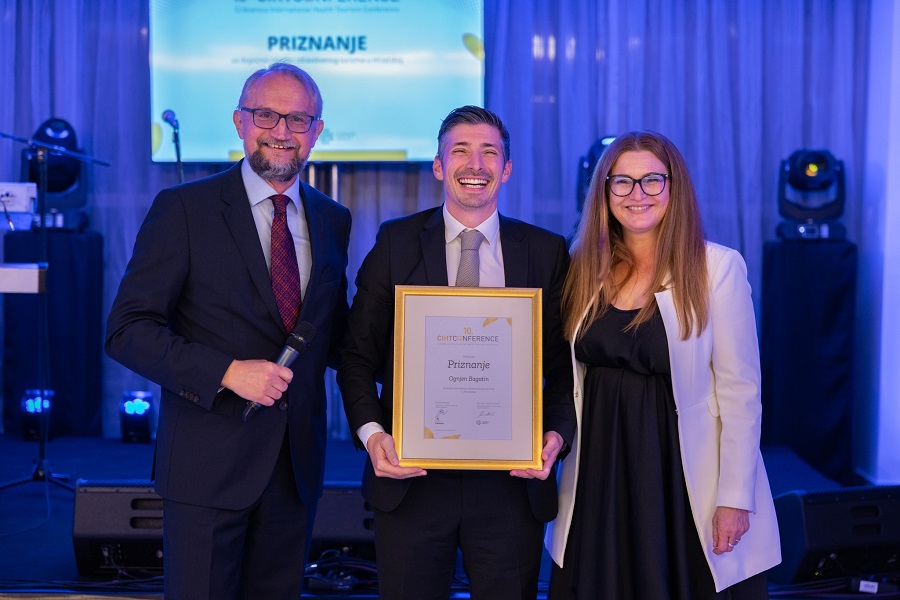
After the workshop, in honor of the 10th anniversary, an award ceremony was held last night for institutions and individuals who, through their successful activities, are responsible for the development of health tourism in Croatia. The following were awarded: Special Hospital Akromion, Special Hospital for Ophthalmology Svjetlost, Polyclinic Glavić, Special Hospital Krapinske Toplice, Special Hospital Stubičke Toplice, Special Hospital Sveta Katarina, Special Hospital for Orthopedics Dr. Nemec, Polyclinic Rident, Thalassotherapia Opatija, Terme Selce, Thalassotherapia Crikvenica, Ognjen Bagatin and Marcel Medak.
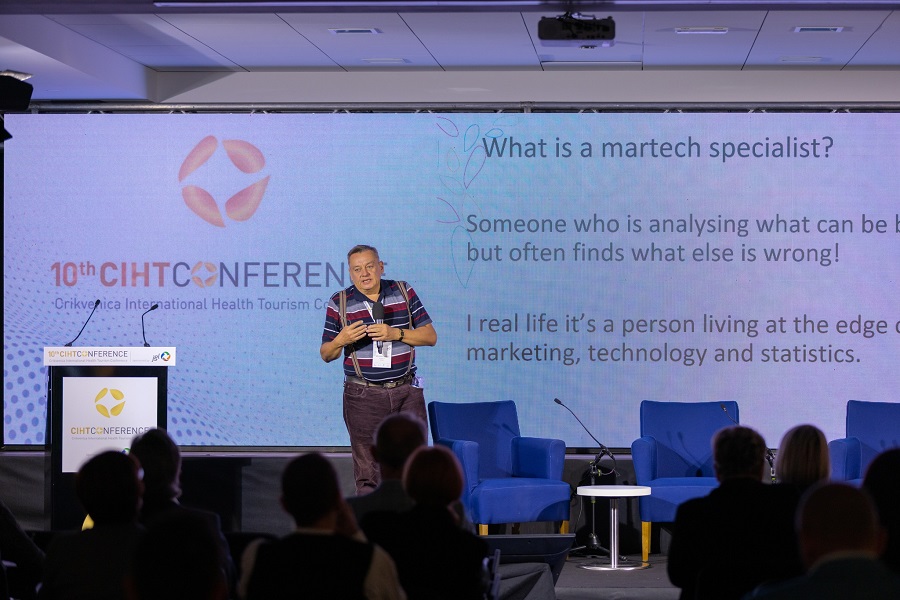
While yesterday the topics of trends in health tourism, investments and development of health tourism were in the center, today's presentations were aimed at identifying the market - who are the patients who use services in health tourism, how to improve the service to meet their needs, how to become an attractive institution and destination for new types of tourists and how to achieve competitiveness and break into new markets.
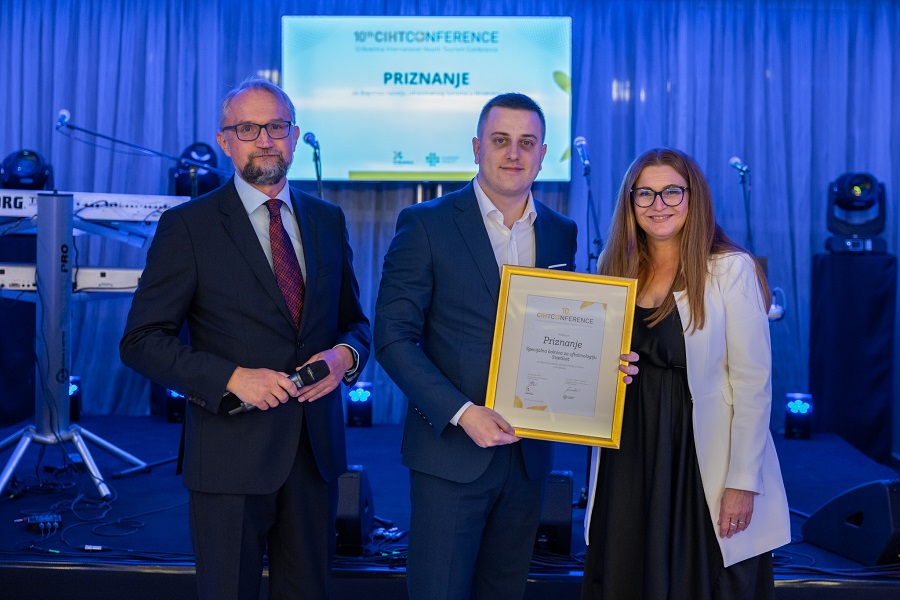
The successful edition of the 10th anniversary CIHT conference is the result of the cooperation of four organizations that put Kvarner on the map of world destinations for rest and rehabilitation: the Tourist Board of the City of Crikvenica and the Kvarner Health Tourism Cluster as organizers, and Thalassotherapy Crikvenica and Selce Thermal Spa as co-organizers.
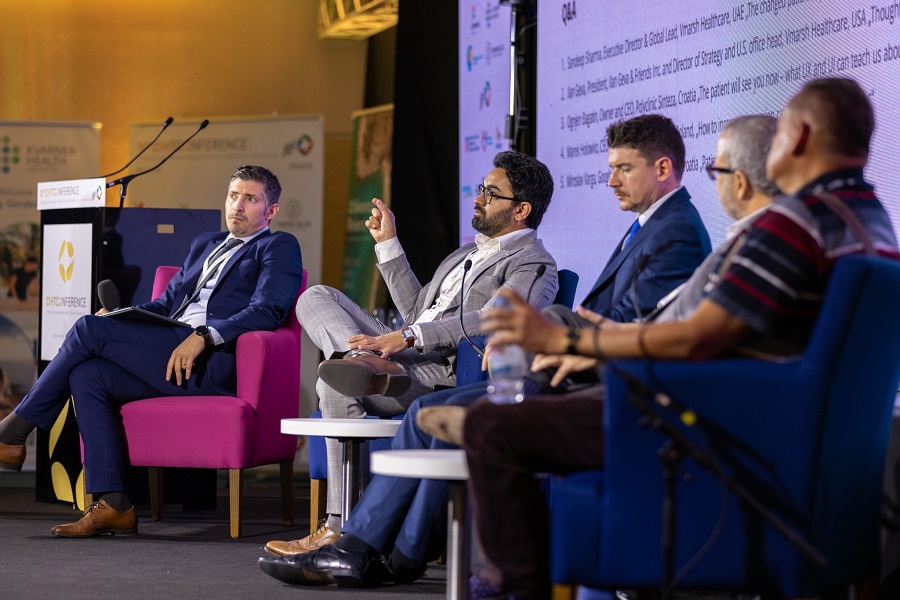
"I think that all participants, and we as organizers, are satisfied with this year's conference. There was a lot of exchange of experiences, agreements, specific joint work, and ideas for the next conference were also obtained with regard to the directions in which health tourism is moving - from the use of digitization, artificial intelligence, regional differences... We are already creating plans and topics for next year , and we also invited some of this year's lecturers to join us", said Assoc. Ph.D. Vladimir Mozetič, MD, president of the Kvarner Health Tourism Cluster.
The general sponsor of the 10th CIHT conference is Jadran-galenski laboratorij d.d., a Croatian pharmaceutical company with global success and recognition. The conference is supported by the Ministry of Tourism and Sports, whose support was crucial in the organization of this conference. The conference is also supported by: Ministry of Health, Primorje-Gorski Kotar County, Croatian Tourist Board, Kvarner Tourist Board, Croatian Chamber of Commerce and City of Crikvenica. Conference partners are Orto Nova - Dental Medicine Center, AmCham - American Chamber of Commerce in Croatia, Jadran d.d. and Ericsson Nikola Tesla d.d. Media sponsors are Jutarnji list and Lider.
After the worthy celebration of the 10th anniversary, preparations for the 11th edition of the conference will soon follow, again with top experts from respected world institutions, interesting discussions on current topics and numerous news.
For the latest news and features on medical tourism in Croatia, follow the dedicated TCN section.
Ilan Geva Interview, Medical Tourism Branding Expert at CIHT 2022
October 17, 2022 - As Croatia's premier health tourism conference, the Crikvenica International Health Tourism conference, prepares to open, TCN catches up with keynote speaker and branding expert, Ilan Geva.
As previously announced on TCN, CIHT 2022 will be holding its tenth Jubilee edition later this week, the premier health tourism conference in Croatia. As with all previous years, there will be a very international field of quality expert speakers, including one of the conference's most-loved keynote speakers, global branding expert, Ilan Geva. TCN caught up with Geva ahead of his latest visit to the Kvarner Riviera, to learn more about the industry in the wake of the pandemic, Croatia's position, and the conference itself, a conference which has strong local support (CIHT is organised by the Crikvenica Tourist Board and Kvarner Health Tourism Cluster, with the Kvarner Region Tourist Board a key sponsor).
1. The medical tourism industry has been shaken up by the pandemic just like every other aspect of life. As things begin to get back to a semblance of normal, what has changed in the industry since pre-pandemic 2019?
A lot has changed. Number one: the consumers. Many of them want to make sure that healthcare providers understand them before they even arrive. That creates a completely different customer profile, and their expectations go together with anxieties and lower trust. Two years of having conflicting messages, different safety rules in different locations etc. contributed to hesitance and wanting to know everything in advance. The second big factor: Transportation is not the same. Airlines are not back in full force. Yes, they may have gotten the airplanes back, but they suffer from a lack of personnel, which means less flights all over the world, which means less comfortable scheduling for patients. The workforce has shrunk in hospitals, clinics, hotels etc., and with it, the level of service deteriorated.
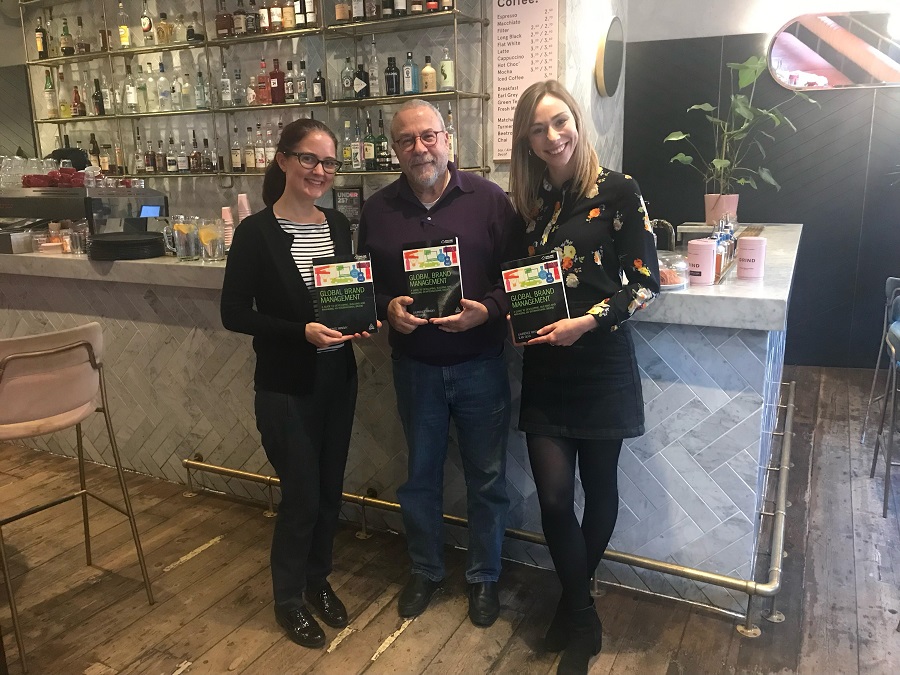
2. You have been a strong supporter of the Croatian medical tourism industry for many years now. What are its strengths and opportunities?
The opportunities are obvious, Croatia has great medical professionals in many specialties. I know personally a few that are really excellent in what they do. So, people are the strength. Opportunities were created because of a lack of activity during the pandemic, many patients need treatment, and they need it NOW! I’m not sure about the rest since the last time I’ve been there, so things may have changed. That is why I am back, and that is why Vmarsh Healthcare, of which I’m the Director of Strategy, is present at this conference to meet with the members of the Kvarner Cluster and see how we can help them. One thing I sense from afar, Croatians are extremely patriotic and proud (as they should be), but that alone doesn’t sell anything.
3. And its threats and weaknesses?
The threats are not just in Croatia. Europe is in trouble, as well as other destinations around the world. We live in a very precarious time, very unstable. The economy is in bad shape; prices are going up all over, obviously, the geopolitical scene is changing rapidly etc. A specific weakness is in the fact that health providers are still not willing to invest in their business, and I mean building brands and doing brilliant marketing. Croatia, like many other destinations, has medical professionals who think that if they are good doctors for the domestic population, they can be successful in attracting global clientele. Not so. Learn from the biggest and the most successful, Mayo Clinic invests in marketing and never stops building its’ brand. Does a small clinic owner in Split have a chance without doing the same? (of course they need to do it with a smaller budget, and smarter…)
4. You are back again in sunny Crikvenica for the 10th edition of the Crikvenica International Healthcare Travel conference, a conference you know well. Tell us about the importance and impact of CIHT, and what are you hoping to get out of it this year?
I don’t know if you noticed, but many European medical tourism conferences have vanished…there must be a reason. CIHT has been here for 10 years because they provide a great platform to the local medical travel, hospitality and wellness industries. And they do it year round, not just in an annual conference. The location is wonderful, and the program is always good, with great speakers. The conference is an important part of the medical travel industry in Kvarner because it is part of building the brand of the destination.
All other conferences are moving around from one location to another, for them its all about the conference, not the local community. CIHT is all about the local community and the Kvarner members of the cluster, very different! this year, I want to meet the providers, get a sense of how their business plans are moving forward, and see where I can help the cluster as a whole.
5. You are a global branding expert. Tell us about the branding of Croatia as a medical tourism destination. It almost seems that the organizers of CIHT, the Kvarner Health Tourism Cluster, has a bigger brand in the industry than Croatia itself.
Shall I be politically correct, or truthful? Yes, the Kvarner cluster is doing a better job than the rest of the country. Enough said.
6. Three things the Croatian medical tourism industry should be focusing on to develop.
1. Build a brand. 2. Build a brand, 3. Build a brand. Not a new slogan, not a new logo, not a new ad campaign with a wonderful new headline. No one cares about that! Do not fracture the Croatian medical tourism brand into hundreds of little clinic brands. Last time I heard, Croatia had 250 different local tourism brands, of regions, towns, resorts, villages etc. Don’t do it in Medical tourism, build a few major regional brands and support them, while they are collaborating and not competing with each other…sounds easy, right? Most important, don’t let the doctors drive the marketing, and build the brands from the inside. Want to know more? Come to my presentation :-)
7. Your presentation is entitled "Thoughts of market penetration strategies for healthcare and wellness operators." Can you give us a teaser?
See above…it is much more involved around internal brand building than the expensive external stuff.
8. And finally, as a regular visitor to Croatia, tell us what makes it special for you. Your favorite place and activity while you are here.
Since I am not looking for a wife or a girlfriend, it must be the air, the sea, the trees, the food, the clean environment, the people, the wonderful history and colors of the place. It is a fantastic combination that makes all my senses sing.
You can connect with Ilan Geva via LinkedIn.
To learn more about CIHT 2022, and to get your ticket, visit the official website.
All Croatian Medical Tourism Roads Lead to Crikvenica at CIHT 2022
October 17, 2022 - After disruption due to the pandemic, Croatia's leading medical tourism conference is back for its Jubilee 10th edition - the Crikvnenica International Health Tourism conference (CIHT 2022).
it is 5 years since Croatian entrepreneur and medical tourism trailblazer, Ognjen Bagatin, invited me to his office at Poliklinika Bagatin in Zagreb to introduce me to a world of Croatian excellence that I knew nothing about - its medical tourism industry. After a tour of Bagatin, Svjetlost Eye Clinic, and St Catherine's Speciality Hospital, I was left stunned. Here was a Croatian industry of global excellence that few people knew anything about. The first of many articles I have written about the Croatian medical tourism industry came out a few days later - Health Tourism is Coming Home: Why Zagreb is the Next Big Medical Tourism Destination.
But while Bagatin was performing miracles in Zagreb (it was an honour to be in Berlin to see him lift the Best International Cosmetic Surgery Clinic in the world at the International Medical Travel Journal awards in December 2019), it did not take me long to realise that the real capital of the Croatian medical tourism industry was on the coast in the Kvarner region, powered by an active and very organised Kvarner Health Tourism Cluster.
The flagship event of the cluster's calendar is the annual Crikvenica International Health Tourism conference, which will take place for its Jubiliee 10th edition, when CIHT 2022 kicks off later this week (full progamme below). I first attended back in 2018, when I was blown away by the quality of the very international field of speakers and participants. TCN interviews from that first event included keynote speakers Keith Pollard, Editor of International Medical Travel Journal, and Sherene Azli, the charismatic CEO of Malaysia Healthcare Travel Council, which was voted soonafter the best medical tourism destination in the world.
The lineup for CIHT 2022 is s fantastic as ever, and with a little more celebratory spice to mark the tenth anniversary. We will be following this year's conference here at TCN - next up an indepth interview with one of the keynote speakers and long-time friend of CIHT, global branding expert, Ilan Geva. You can find the schedule below, and there are still tickets available via the official CIHT 2022 website here.
Wednesday, 19th of October 2022
Workshop I
17:00 – 18:00
Thursday, 20th of October 2022
Opening ceremony and welcome speeches
09:30 – 10:00
Part I – New, Newer and the Newest in Health Tourism
10:00 – 11:30
- Irving Stackpole, President, Stackpole & Associates, Inc., USA „The Hybrid Future of Medical Tourism“
- Mario Škugor, M.D. FACE, Clinical Assistant Professor of Medicine CCLCM of CWRU and Director of Education, Cleveland Clinic, USA „Patient experience in Cleveland Clinic“
- Elizabeth Ziemba, JD, MPH, President & Founder, Medical Tourism Training, USA „“Accessible” Tourism: The Markets Hidden in Plain Sight. Why investing in accessible travel offers a ROI that also expands tourism, wellness, dental & medical tourism markets.“
- Maria Jukić, JD, Senior Director, Arts & Medicine Institute, Cleveland Clinic, USA „The Arts as Treatment and Differentiator in Healthcare“
11:30-12:00 – Break
12:00 – 13:00 Panel HEALTH TOURISM AND SPORTS REHABILITATION
- Prim. Vlasta Brozičević, M.D. specialist in physical medicine and rehabilitation, rheumatology, Department Head and member of the Board, Polyclinic Terme, Croatia
- Danijel Premuš, MD, Cardiology specialist, Thalassotherapia Opatija, Croatia
- Pero Kuterovac, Conditional and strength coach, Croatia
- Martina Linarić, PHD, Owner, Center for Nutrition and Holistic Approach to Health, NutriMarLIn, Croatia
13:00-13:15 – Break
Part II – Health and Health Industry: Investment and Development
13:15 – 15:00
- Joško Brkić, Global Brand Manager, JGL d.d., Croatia „Investing, Adapting, Thriving“
- Stjepan Orešković, PHD, Scientist and entrepreneur, M+ Group, Croatia „Entrepreneurship in healthcare“
- Igor Čičak, CEO & Managing Partner, Provectus Capital Partners, Croatia „PROVECTUS CAPITAL PARTNERS (PCP): Leading growth capital investment firm in South East Europe“
- Slavko Štefičar, Director, General for Sustainable Development and Competitiveness of Tourist Destinations at Ministry of Tourism and Sport, Croatia „Possibilities of financing the development of health tourism in the Republic of Croatia“
- Mario Ravić, Head of IoT & Digital Health, Ericsson NikolaTesla d.d., Croatia „Internet of things in health tourism journey – quantify it all“
15:00-17:00 – Lunch
17:00 – 18:00 Workshop II – Careers in Health Travel
by Elizabeth Ziemba and Irving Stackpole
20:00 Gala dinner with a presentation of awards in recognition of personal/institutional contribution to the development of health tourism in Croatia
Friday, 21st of October 2022
Part III – Medical Tourism and Patient Expectations
10:00 – 11:30
- Sandeep Sharma, Executive Director & Global Lead, Vmarsh Healthcare, UAE „The changed patient experience post pandemic – The global yet local insight“
- Ilan Geva, President, Ilan Geva & Friends Inc. and Director of Strategy and U.S. office head, Vmarsh Healthcare, USA „Thoughts of market penetration strategies for healthcare and wellness operators“
- Ognjen Bagatin, Owner and CEO, Polyclinic Sinteza, Croatia „The patient will see you now – what UX and UI can teach us about anticipating patients expectations“
- Marek Holowko, CEO & Co-Founder, Clinic Hunter, Poland, „How to increase conversion rate – best practices and tips“
- Miroslav Varga, Google certified trainer, Escape Ltd., Croatia „Patients are people. Do we know people?“
11:30 – 12:00 – Break
Part IV – Natural Healing Factors and Health Tourism
12:00 – 13:30
- Marijana Biondić, Director, Crikvenica Tourist Board, Croatia „From natural healing factors to one of the best health tourism destinations in Croatia“
- Assist. prof. Vladimir Mozetič, MD, PHD, MHA, President, Kvarner Health Tourism Cluster, Croatia „From clustering to the region of health and wellbeing“
- Ministry of AYUSH, India
- Simone Zagrodnik, Executive Director, European Historic Thermal Towns Association, Germany, „“Thermal Travels” – Spa Towns as Places of Health, Wellbeing and Culture“
13:30 – 15:00 – Lunch
15:00 – 19:00 Additional activities
All Croatian Medical Tourism Roads Lead to Crikvenica with CIHT 2021
October 23, 2021 - The enormous potential of the Croatian medical tourism industry will once more be the focus next month, as global experts assemble for the annual Crikvenica International Health Tourism conference, CIHT 2021.
After reporting on the news about Croatia for a number of years now, certain things begin to follow a pattern.
I always report on the Za Krizen procession in Jelsa just before Easter, for example, and there is always a visit to Advent in Zagreb. And early November is reserved for one of my favourite - and impressive - conferences in Croatia, the Crikvenica International Health Tourism conference, or CIHT 2021.
It has a special place in my heart as it was the catalyst for probably the most unlikeliest stories of my writing career a couple of years ago, as my wife and I found ourselves on a plane to Malaysia where I picked up an award for best online international feature as the inaugural Medical Travel Media Awards in Kuala Lumpur.
Crikvenica and Malaysia may seem an unlikely combination, and I would have agreed with that had I not met one of the most energetic promoters of all things Croatia, Ognjen Bagatin.
Co-owner of the hugely successful Bagatin Clinic, Ognjen was passionate about the promotion of the medical tourism industry and realising its potential.
When I met him, I had no idea that Croatia even had a medical tourism industry. Within 10 minutes of meeting him, I was wondering why the whole world didn't know about the excellence on offer in Croatian clinics, and at very competitive prices.
It did not take me long to learn that the biggest brand in Croatian medical tourism globally - with the possible execption of Bagatin Clinic at St Catherine's Specialty Hospital - was not in fact Croatia itself, but something called the Kvarner Health Tourism Cluster. This was an alliance of interested stakeholders in the medical tourism industry who were doing fantastic work bringing patients for treatment in a number of specialist medical fields, from dentistry to physiotherapy.
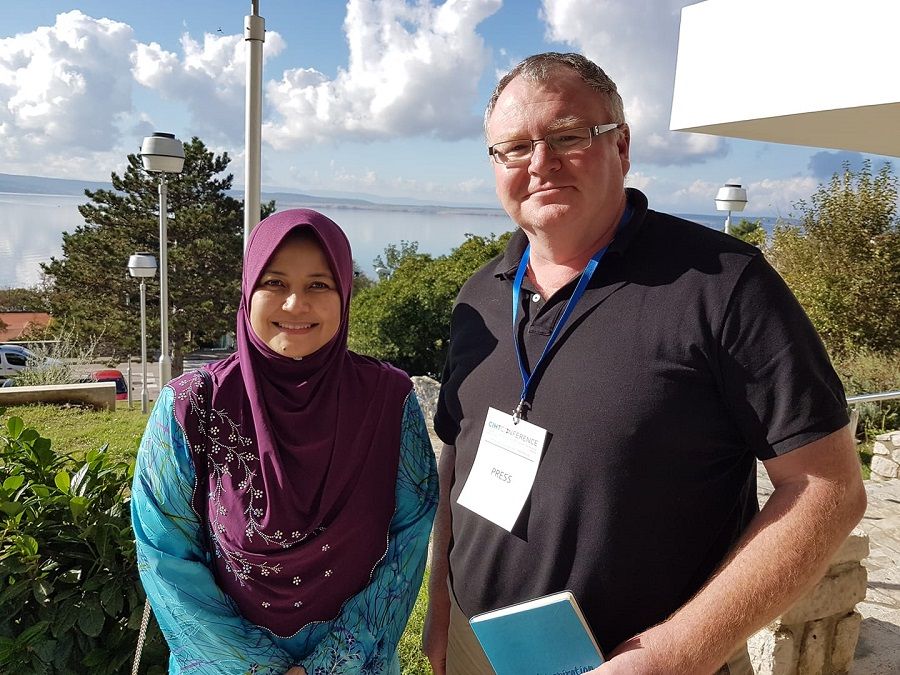
The highlight of the Kvarner Health Tourism Cluster's calendar was an annual conference called CIHT (Crikvenica International Health Tourism conference). Ognjen encouraged me to participate where he promised a great conference with some outstanding presentations and people to interview.
I was stunned by the high-quality of the international experts who had all made the journey to the Crikvenica Riviera for this health conference out of season in November. Keynote speakers I got to interview included Keith Pollard, Editor-in-Chief of the International Medical Travel Journal, Ilan Geva from the USA, a leading medical tourism (and other) branding specialist, and Sherene Azli, the charismatic CEO of the Malaysia Healthcare Travel Council.
Sherene's presentation was one of the finest I have seen at every conference, and little did I know it, but that interview started a chain of events which would have me on that plan to Kuala Lumpur less than a year later.
A year later, I was back in Crikvenica, this time also as a (terrible) conference speaker, sharing the podium with medical tourism experts who had flown in from leading establishmnents such as Mayo Clinic and Cleveland Clinic.
The Crikvenica was a hit, and a significant player in the global medical tourism calendar. And after the horrors of the 2020 pandemic, I shall once more be making my way down to the Crikvenica Riviera early next month, to take part in CIHT 2021.
After a brief (ok, not so brief) COVID interruption last year, Croatian medical tourism is back, and with some very useful additions to the story. The massive expansion of Ryanair (40 destinations for Zagreb alone by next summer) is opening up affordable Croatian medical tourism to more countries and destinations than ever before.
Another welcome trend is the rise in the remote work culture. Croatia is enjoying considerable success in its digital nomad story, and the excellent services of the medical tourism industry should be inserted into that initiative, to the benefit of all sides.
CIHT 2021 once more has a very strong lineup, and anyone interested in the medical tourism industry will find a night for them at this year's event. You can see the programme of the two-day event above, and you can get more details and register on the official website.
I can't promise you a trip to Malaysia if you do attend, but it is definitely one of the best organised, most social, and content-rich conferences on the Croatian conference scene.
CIHT 2020: 8th Crikvenica International Health Tourism Conference in a Completely New Setting!
October 20, 2020 - One of Croatia's most important medical tourism conferences, CIHT 2020, will go ahead next month, albeit in a very different format.
The Crikvenica International Health Tourism Conference will be held for the eighth time in a row, on the 12th and 13th of November 2020, in a virtual form. Due to the circumstances of the coronavirus pandemic, this conference, which was traditionally organized on the Crikvenica Riviera, will change its concept and move to a completely online environment, it will be completely free of charge and the participants will be able to attend via new CIHT mobile app.
In order to present world trends and European experiences in health tourism, its marketing opportunities, as well as to present the achievements of Croatia and the best examples from practice, this two-day conference will host national and foreign experts in health, tourism, and marketing. The speakers who confirmed their participation are Keith Pollard, Csilla Mezösi, Irving Stackpole, Laszlo Puczko, Elizabeth Ziemba, Jeana Havidich, Michaela Kehrer, Ilan Geva, as well as Velimir Srića and Miroslav Varga. On this prestigious list of speakers is also Ph.D. Ivan Đikić, MD, who, from the position of his profession and his own experience, will cover the complex topic of the impact of the virus on health tourism. These experts are of great importance, not only for the Primorje-Gorski Kotar County but also for the entire Republic of Croatia. Moreover, these are experts who participate as speakers in numerous eminent world health and tourism conferences and cooperate with the largest companies in this field.
In addition to the presentations by top experts, the CIHT Conference offers the opportunity to create business contacts and partnerships, exchange experiences, and arrange concrete collaborations. The priority in the organization of the CIHT conference is, first of all, the quality of the content through which the participants can gain new knowledge that they will later apply in their daily work. This year's CIHT conference continues to contribute to the application of current theoretical knowledge and trends in practice, emphasizing the strategic importance of the development of health tourism. Given that we are in the period of the COVID-19 pandemic, the 8th CIHT Conference is especially needed.
You can follow everything about the 8th CIHT Conference on its official website ciht.com.hr, as well as on the Facebook profile CIHT Conference Crikvenica Croatia. Highlights of last year's event are in the video below.
For more on the Croatian medical tourism story, follow the dedicated TCN section.
Lessons from Malaysia in Croatia: MHTC CEO Sherene Azli on Health Tourism
November 12, 2018 - One of the many things I love about my job running Total Croatia News is that there is so much to cover in this beautiful country, and each day brings a new surprise and opportunity for learning.
It is now more than a year since I was alerted to the quality of the very best in Croatian health tourism. St Catherine Specialty Hospital, a Leading Hospital of the World and recent European partner with Mayo Clinic for the new OneOme RightMed pharmacogenetic test; Bagatin Clinic, named the best dermatology clinic in Europe to add to a host of dental awards; Svjetlost Eye Clinic, a regional leader attracting Hollywood stars from California. The list goes on. You can read more about my early discovery of health tourism in Croatia here.
All this led me to a specialised workshop at Bagatin Clinic last Monday, where global medical travel branding guru Ilan Geva spent the day with industry leaders discussing the branding of Croatian medical tourism. It was a very thought-provoking day for all involved, and it was – for me – the first mention of an Asian country which was apparently setting the standards in medical tourism worldwide. As I noted in my report on the seminar:
A little online research, and it seemed that everyone was talking about Malaysia – the Facebook page of International Medical Travel Journal last week was quoting the Malaysian Prime Minister.
Three days after Ilan Geva’s seminar in Zagreb, I found myself taking him up on his suggestion to come down to Crikvenica to see how the Kvarner Health Cluster was doing things. One of the keynote speakers at the Crikvenica International Health Tourism conference was Keith Pollard, Editor in Chief of IMTJ, who kindly agreed to an interview with TCN (you can read it here). He also had some rather nice things to say about Malaysia:
It was time to meet Malaysia…
I have been to a lot of conferences in my life, but I was not quite prepared for what happened next. Sherene Azli, CEO of the Malaysian Healthcare Travel Council (MHTC) gave a presentation called Experience Malaysian Healthcare, Embrace Malaysian Hospitality.
She put on quite a show.
Before we get to Sherene’s presentation, one of the best moments of the first day of the conference was Sherene’s explanation of this slide, above.
“I am probably the only Muslim in the room,” she said. “But I want to share something with you regarding hospitality. On the left in the photo above is what greeted me in my Crikvenica hotel room – qibla, prayer mat and Koran. And on the right – halal breakfast options. I have only had that once before in 60 countries of travel – last year at the Hilton in Zagreb. Thank you Croatia, I have learned something that we can implement back in Malaysia.”
It was a beautiful and humble moment for me – here was the market leader coming to help a country trying to establish itself on the market, but humble enough to recognise and emerge from the experience with a learning experience of its own. I was beginning to have warm feelings for Malaysia…
How many people know where Malaysia is? Croatia is obviously not a target market for Malaysia for medical tourism, or for Croatians for tourism in general, but I felt a little embarrassed that I could not quite pinpoint Malaysia on the map. But what followed has had me researching Malaysia a lot since.
For this is a country which has REALLY got its act together, bringing all its key institutions together for the greater good – the promotion of Malaysia as a medical tourism destination. After her very impressive presentation, I asked Sherene how Malaysia did it and how it all started:
It started maybe 15-20 years ago, but on a very small scale. Back then Penang was a destination for Indonesians. But back then, the trend was more outbound - Malaysians would travel to places like Singapore to get treatment. But once we noticed Indonesian visitors coming to Penang for treatment, we noticed perhaps the potential to develop this sector of tourism.
So in 2009, we set up the Malaysia Healthcare Travel Council, as a department in the Ministry of Health. By 2011, it was made into a corporate body. It is like a private body, but I report to ministers. It used to be the Minister of Health, but now it is the Minister of Finance.
The mandate was twofold - facilitation of the industry and then the promotion. So before we could start selling what we had, we had to get the facilitation right. MHTC has been doing that since 2011, looking at tax allowances, how we build the infrastructure, how we encourage development with the different states of Malaysia. I gave the example of Penang in my presentation, but we work with all the different states in Malaysia.
After we did all the planning for the facilitation, we embarked on promotion. For Malaysia, one of the challenges is that our currency is quite weak. So when we want to promote internationally, it is very costly. In China, for example, a simple campaign can cost US$1 million, and we don't have that money.
So what we have done is to collaborate with Malaysian agencies on the ground such as Tourism Malaysia or investment organisations like the Malaysian External Trade Development Corporation. It is very expensive for individual hospitals to go out and promote, so we help with the coordination. So the private sector invests in a more cohesive manner, and we have a culture of cooperation and competition. Focus on marketing the destination - Malaysia - first and foremost, then build your brand as an individual hospital or clinic. So that has been our strategy, and we have made a lot of progress since 2011.
Now EVERYONE wants to be in medical tourism, and the competition is strong. The bar was already high, but now it must go higher.
And here we are in Croatia. How did you get here?
It is actually my second time. I was invited to speak at a conference in Opatija last year. I was invited to speak at CIHT 2018 to share our experiences in Malaysia, and I am delighted to be here. It is a very beautiful country.
I am quite new to the medical tourism scene, and I don't have your experience or perspective. Tell me about Croatian medical tourism from your perspective - how is it doing?
Croatia has a very rich tourism history, dating back to the 19th century I think. Regarding medical tourism, there is big potential, but unless you can get everyone working together, the results will be very fragmented. Whether you like it or not, Kvarner Health Cluster is doing a great job promoting this region, but it may seem to be in competition with other regions in Croatia by doing that.
If you are promoting Croatia, and one region in particular is promoting itself, it is then competing against other regions, and that can be a waste of resources. All the stakeholders should be working together. In Malaysia 90% of my job is working with the stakeholders towards a coordinated approach.
This is my fourth year in the job, and I realised that if it was going to work, I needed the support of the main stakeholders. So I went to see them and asked them to support me in my decisions, or this was not going to work. It has not been easy, but we are making progress.
Coming back to Croatia, what is the reputation of Croatia's medical tourism industry? Does it have one?
When it comes to medical tourism in Eastern Europe, there are two countries which always come up - Croatia and Hungary. So the good news is that you are in the top two, but then I hear about Kvarner and other things, and I get confused - where is the focus? That's my perception. I may be wrong, but that is how it comes across to me.
So it is fair to say that Kvarner almost has a bigger brand than Croatia for health tourism?
Yes, definitely. Which is good news for Kvarner or course. But looking at Malaysia, perhaps it is similar to how Penang was at the beginning. But one thing we realised very early on in Malaysia is that everyone can benefit. You don't have to fight. I was given a mandate to bring everyone together for the benefit of Malaysia and the health tourism sector, and that is what I am working very hard to do.
(Perhaps Malaysia’s best medical tourism ambassador – its 93-year-old Prime Minister who had a double heart bypass when he was in his 60s and 80s. In Malaysia of course…)
To learn more about medical tourism in Malaysia, visit the MHTC website here.
To follow TCN coverage of health tourism in Croatia, click here.
Safe Croatia: Understanding Chinese Perceptions of Croatian Medical Tourism
A fascinating pilot survey in China by a New York university at the 6th Crikvenica International Health Tourism Conference on November 8, 2018 opens up an intriguing possibility for Croatian medical tourism. Small steps, but ones worth following up.
The more I get involved in the Croatian medical tourism story, the more fascinated I become. And the more I become convinced that Croatian medical tourism is the single most important sector for Croatia to be investing its time and marketing in. With so many competitive advantages, as we have previously discussed, the only thing that is holding Croatia back from this potentially billion-dollar industry, is local cohesion, a brand and a strategy and roadmap of how to get to the next level.
Yesterday, we touched on the views of various international participants of the conference, which included 18 high-quality speakers, all experts and market leaders in their medical tourism fields. You can read that article here, an article with a Malaysian feel after Malaysian Healthcare Travel Council CEO Sherene Azli's eye-opening presentation on how Malaysia became the number one medical tourism destination in the world. We will publish an interview with Sherene shortly.
Although I knew that the Kvarner health cluster was the most progressive body in the emerging Croatian medical tourism industry, I will confess to being more than stunned at the quality of the speakers - both Croatian and international - as well as some of the very niche topics which were presented. Professor Christine A. Lai, from the State University of New York Buffalo State, for example, with a presentation entitled Understanding Chinese Perceptions Toward Croatian Medical Tourism.
Niche indeed...
And fascinating.
The potential of the Chinese medical tourism market had already been touched upon during the Malaysian presentation, as Sherene pointed out some of the regional opportunities for Malaysia. With changes to China's infamous one-child policy, there are now apparently over 40 million Chinese women over 40 (as I understood it) interested in IVF treatment. If Malaysia could position itself as the regional leader in that industry, Malaysia's already booming health tourism industry would boom even more. But how could there be an opportunity for Croatian medical tourism with Chinese patients?
I sadly missed the opening of Professor Lai's presentation as I was interviewing Sherine, but as I understood things, Professor Lai's academic connections to China enabled a very limited modified Fishbein survey on perceptions of medical tourism destinations around the world. The sample size was small and very educated (young students), so there is no suggestion that this is a definitive study, but rather perhaps a seed worth planting to see if it could turn into something very solid indeed. As Professor Lai's slides showed, Croatia is being discovered by a greater number of Chinese each year.
South Korea, Germany, USA, Japan and Croatia were included in the study. The most important factor in the study for Chinese respondents? Safety. One of Croatia's strengths. Croatia, Full of Safe Places. Maybe time to make more of the branding of Ivan Vucetic from Hvar, the father of dactyloscopy...
So what are the attributes which are most important to this small educated Chinese sample? Scores above out of 5. Safety.
And from a medical tourism point of view? The requirements were understandably more stringent.
And then the big shock. Taking into consideration all the factors from safety to price in Japan, South Korea, Germany, USA and Croatia, there was only one clear winner - Croatia. And look how strongly Croatia performed on safety.
A summary of the scores.
It is too early to start building clinics in Zagreb and beyond for millions of incoming tourists to the Croatian medical tourism industry, but it is not too soon to start taking the findings of this very small sample and expanding it to see where this might lead. The perception of 'safe' in this increasingly troubled world, combined with strong medical reputation, great prices and a strong tourism offer, could well prove to be quite a bonanza for the Croatian medical tourism industry.
The Croatian National Tourist Board opened an office in Shanghai last week. One of the lessons from Malaysia which I will be looking at in my interview with Sherene Azli is the use of all Malaysian institutions to promote the medical tourism industry. The Malaysian Healthcare Tourism Council only has two offices abroad (from memory in Vietnam and Indonesia) - all the rest of the marketing is done through the network of offices of the Malaysian Tourist Board.
Imagine the same happened in Shanghai. Croatia, the safe European destination full of tourism, but also a destination for high-quality, affordable medical tourism.
Croatia could hit its goal of becoming a 12-month tourist destination quicker than planned if it plays its cards right.
The time for a big push on Croatian medical tourism is now.
To learn more about the Crikvenica International Health Tourism conference, click here.
To follow the latest on the Croatian medical tourism industry on TCN, click here.
Malaysia Shines at CIHT Kvarner Health Tourism Conference in Crikvenica, Croatia
November 8, 2018 - How Malaysia became the world's best medical tourism destination, lessons in branding Croatian health tourism, and much more in an outstanding first day of the Kvarner Health Cluster CIHT conference in Crikvenica.
I had known in the back of my mind somewhere that the Kvarner health cluster was doing an amazing job at promoting health tourism on the northern coast of Croatia, but it was only today that I fully appreciated quite how well they were doing. An email exchange with leading global medical travel branding expert Ilan Geva recently led me to attending his specialised workshop on how to brand Croatia as a medical tourism destination in Zagreb earlier this week, and he filled me with enough enthusiasm and curiosity that I found myself on the road at 6am this morning - destination Crikvenica for the Kvarner health cluster's 6th Crikvenica International Health Tourism Conference at Hotel Omorika overlooking the Adriatic Sea. The conference, also supported by local regional and national bodies and tourist boards, included representation from the Ministry of Health, Ministry of Tourism and Croatian National Tourist Board.
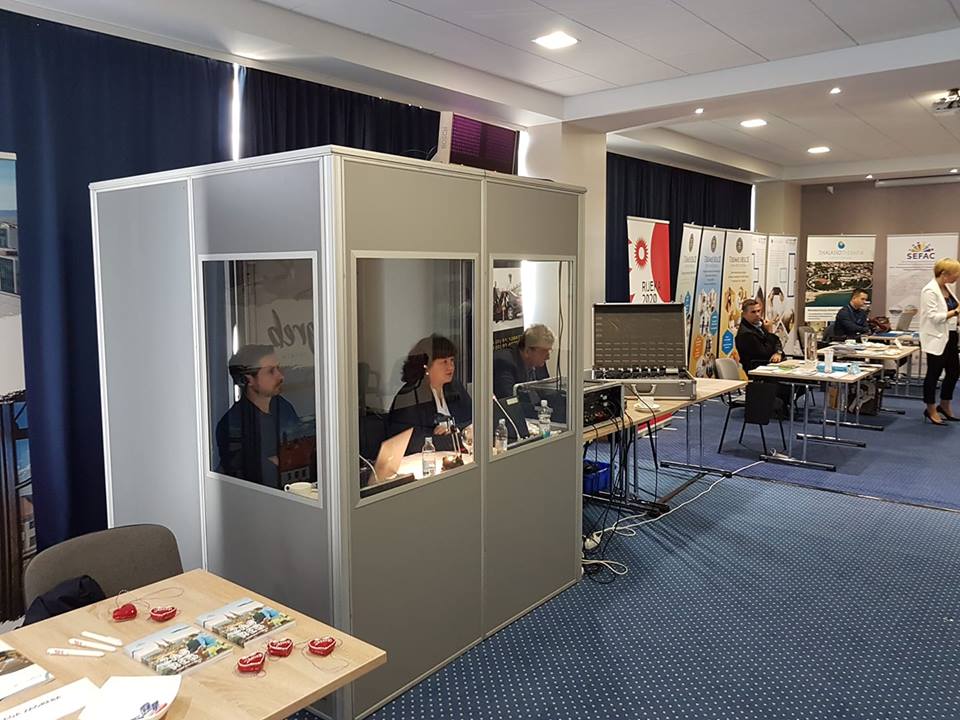
I have attended a number of conferences in recent months in Croatia, and there were so many aspects of CIHT that really caught the eye, once one had devoured all the superbly presented information on the event website, including welcome video messages from four key international speakers. There are 18 international speakers in all, experts in their field back in their native countries, and each with some expertise to share to help the Kvarner health cluster and medical tourism in Croatia learn and grow. One of my favourite details - simultaneous translate available in both English and Croatian (speakers spoke in different languages - see photo above) - although I didn't use the service, the speed with which the panelists answered questions indicated what a high-quality job the interpreters were doing.
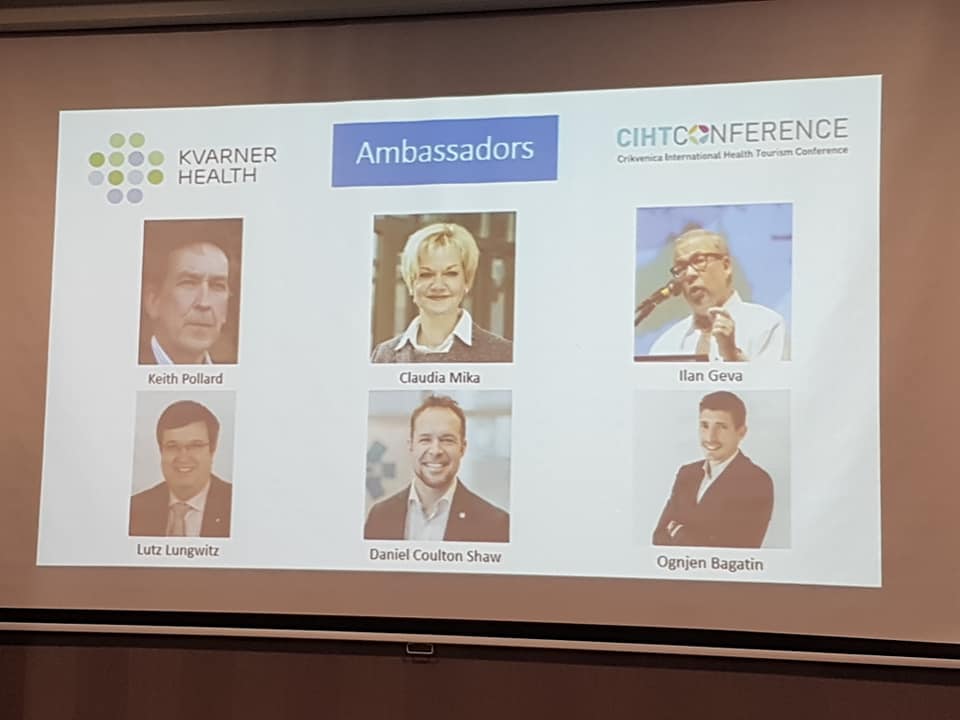
The high-quality nature of the international expertise was perhaps best illustrated after the introductions, as the Kvarner Health Cluster made a presentation to its six ambassadors in recognition of their work.
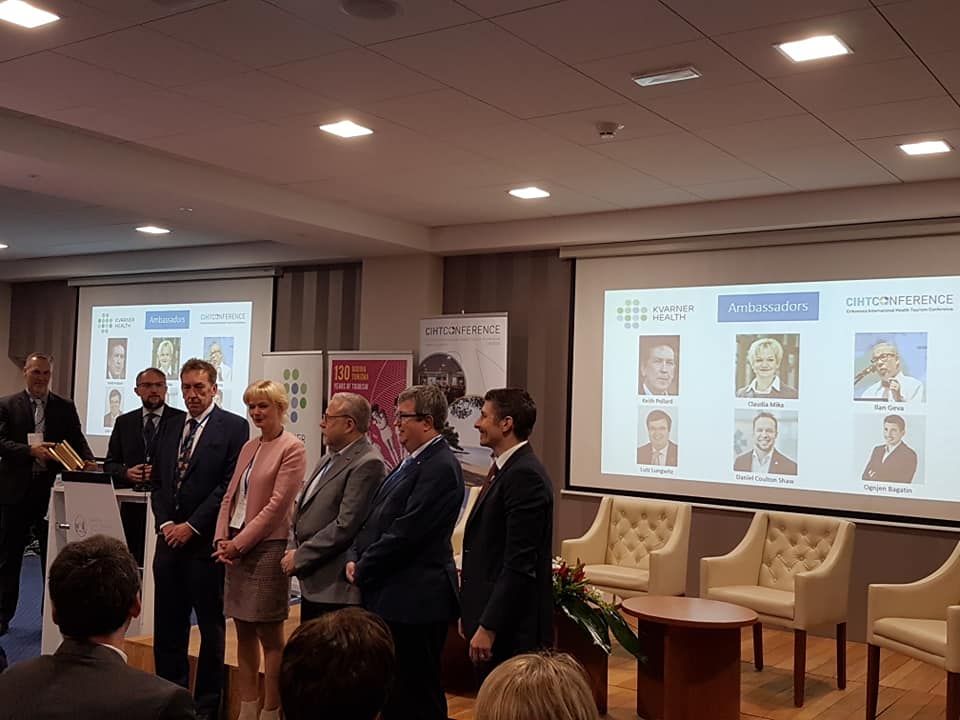
Keith Pollard, Editor in Chief of International Medical Travel Journal (IMTJ), Claudia Mika, founder and CEO of Temos International in Germany, Lutz Lungwitz, President of the German Medical Wellness Association, Daniel Coulton Shaw, co-founder of Global Clinic Ranking and Smile Clinic Slovakia, Ognjen Bagatin, CEO of Bagatin Clinic in Zagreb, and Ilan Geva. Geva was put to the back of the list for the presentations, as he was given an additional gift - a Luka Modric football shirt, which he had jokingly requested previously. A nice touch.
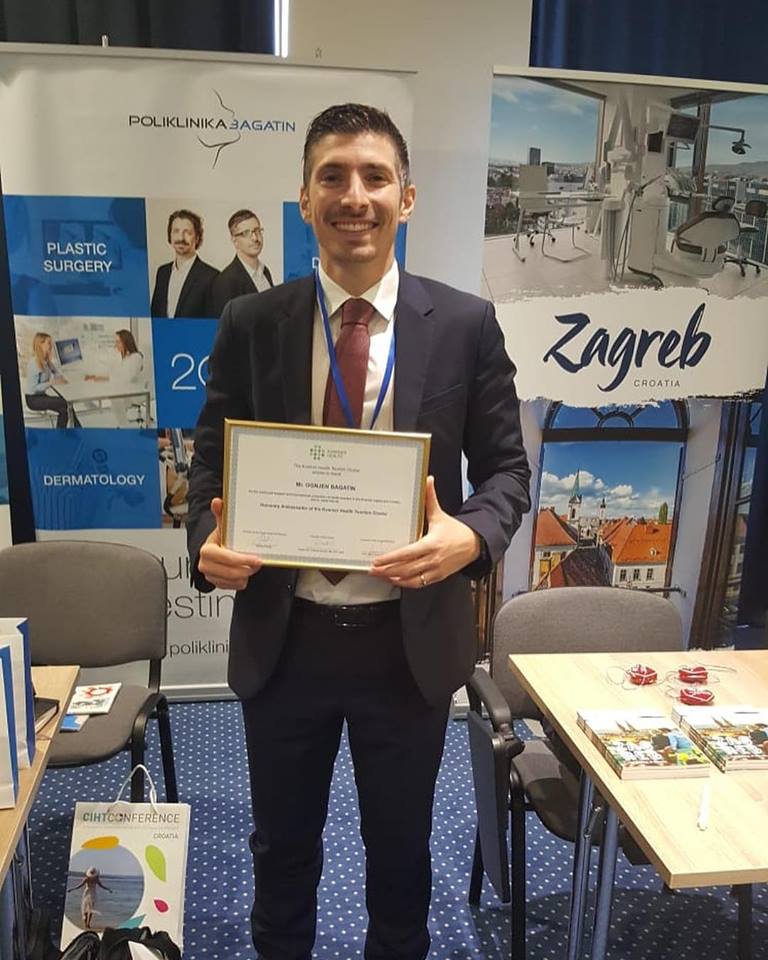
It was particularly pleasing seeing young Bagatin get recognised for his efforts. There is no more avid - or effective - promoter of medical tourism in Croatia today, and his tireless travelling of the globe and local lobbying to move the story forward has placed his as the key person in developing the Croatian medical tourism story.
With such a star-studded lineup, I was expecting some great information and presentations, but I was not quite prepared for what followed. Malaysia has been named as the best in medical tourism travel for several years in a row, and Sherene Azli, CEO of the Malaysian Healthcare Travel Council was on her second visit to Croatia to explain how they did it. It was perhaps the most impressive presentation I have heard in my time in Croatia - of how to make an industry go from nothing to the world's best in just a few short years. And I was not the only one who was absolutely stunned at the Malaysian approach and cohesion of all the major stakeholders; I overheard one of Croatia's most successful clinics (I will not mention which) approach Sherene after the presentation, gushing with praise at the achievement, and lamenting the fact that such togetherness could be achieved elsewhere but not in Croatia.
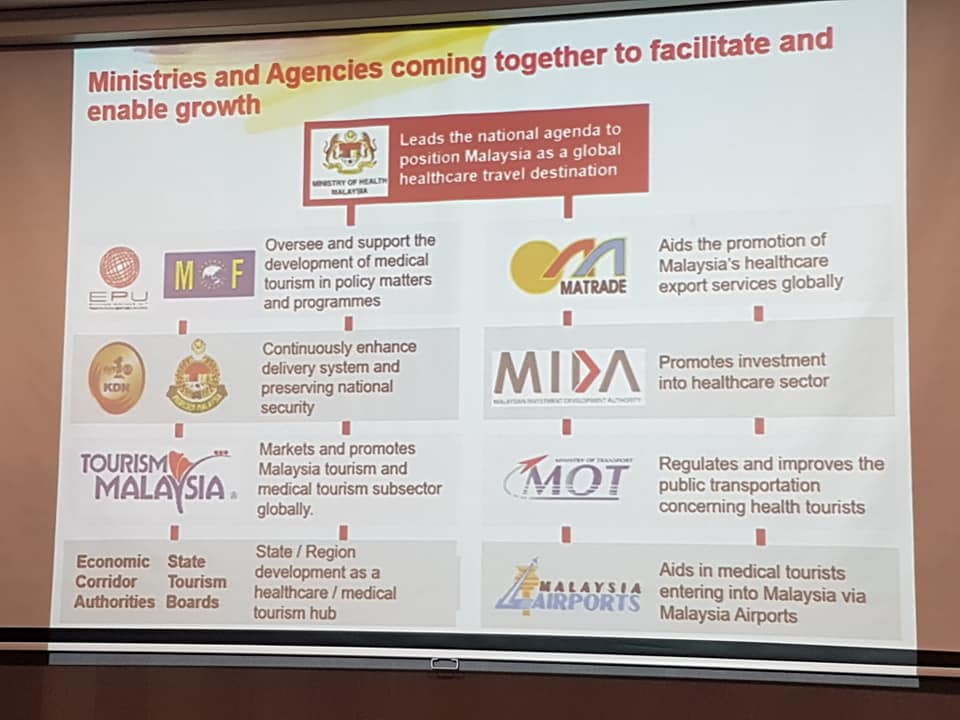
Sherene kindly gave TCN an interview in the November Crikvenica sunshine, which I will publish in full in the coming days. It is quite a story, but I leave you for the moment with two things - the slide above listing all the major stakeholders who are all working as one, with Sherene coordinating all. About 90% of her job is managing the stakeholders, but 100% unity of the relevant institutions from marketing to arrival at the airport. A dedicated medical tourism waiting lounge is the first contact, which includes a transfer to the clinic. And the second teaser for now - take a tour of the Malaysian medical tourism experience in the official video below.
And then perhaps the nicest moment of the morning session of the first day of this Kvarner health conference - a thank you to Croatia from Sherene not only for some thoughtful hospitality she had never encountered in 60 other countries she has visited, but hospitality which showed her how Malaysia could improve its service and hospitality thanks to her experience in Croatia.
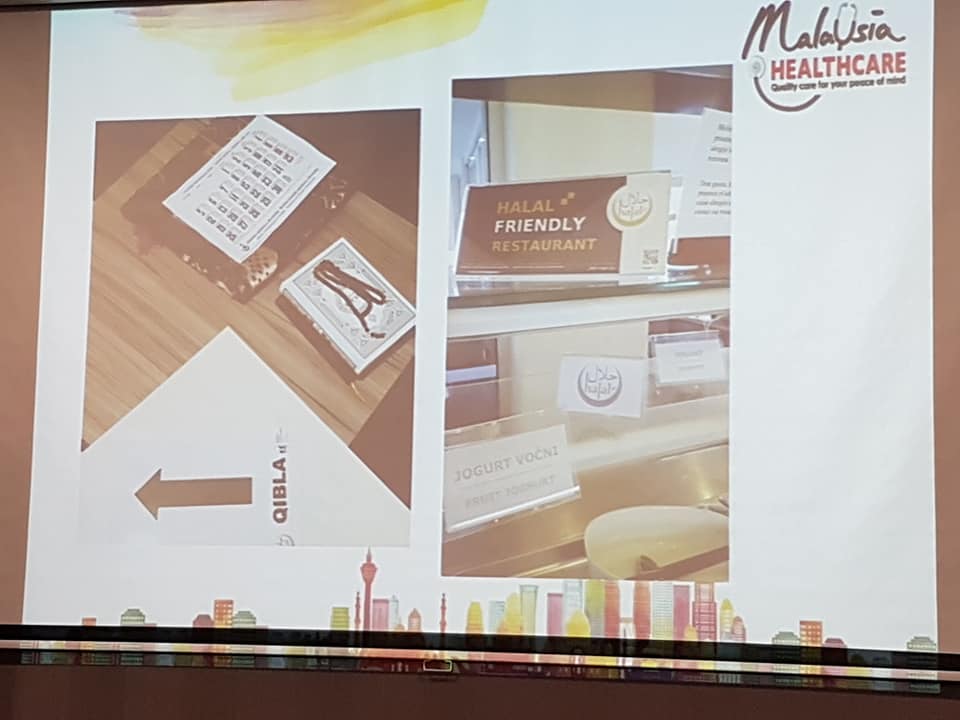
I am probably the only Muslim in the room, she said, as she showed us a slide of two tiny details that made her feel truly welcome and that had never happened anywhere else. On the left, prayer mat, qibla and Koran which she found in her room, on the right Halal breakfast options.
"I have only come across this halal option once before on my travels," she said. "At the Zagreb Hilton last year."
Well done Croatia. Those little details make a big difference.
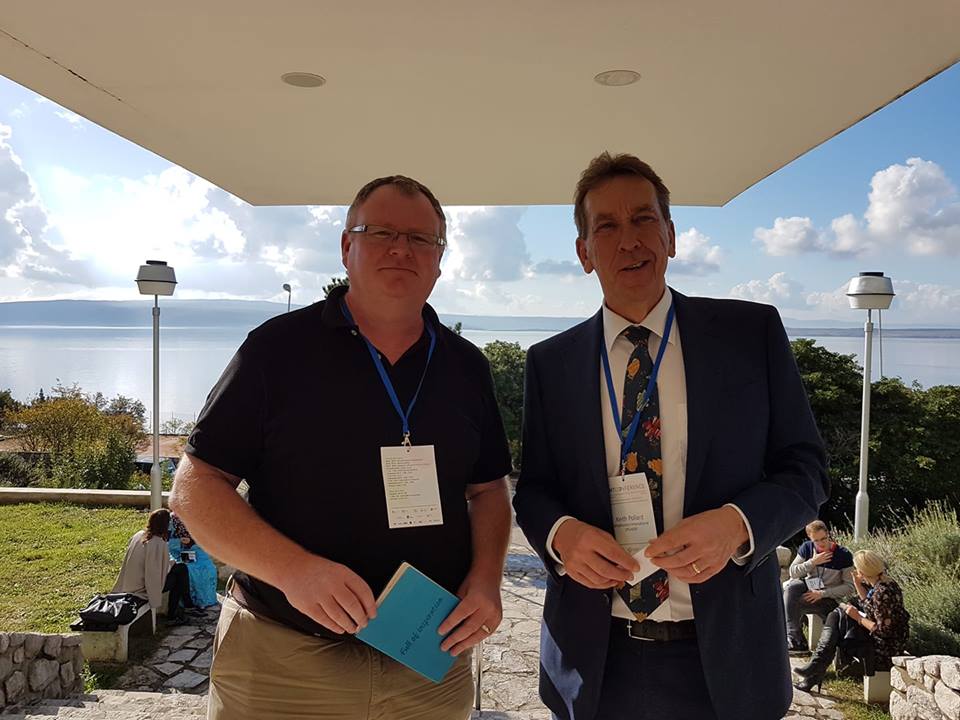
Sherene was not the only fascinating speaker. The first morning session consisted of the following:
Is Kvarner health a tourism destination following the EU scenarios for health tourism development? Milena Persic, Full Professor at the Faculty of Tourism and Hospitality Management in Croatia.
Developing a medical travel strategy for a hospital or clinic. Keith Pollard of IMTJ. Keith, pictured above right, is a fellow Brit and also kindly gave an interview on the potential of Croatian medical tourism, one which I will also publish shortly.
How to use TRUST in building the brand of your country, hospital, and people. Ilan Geva from the United States.
Understanding Chinese perceptions towards Croatian medical tourism: a Fishbein model based on competitive analysis. Christine A. Lai, Professor at the State University of New York Buffalo State, USA.
University Eye Hospital Svjetlost - from a single practitioner office to an international chain of eye care centers. Ivan Gabric from Eye Hosptial Svjetlost in Croatia.
A global patient stream turning online - the key ingredients to grow your patient base. Martina Viduka, Clinic Relationship Manager of Qunomedical, Germany.
France Surgery - the key to success. Carine Briat-Hilaire, CEO and Co-Founder of France SURGERY, France.
Development of international cooperation in the Lublin Medicine Cluster in the field of scientific research and innovation in medicine, health, and education. Dariusz Matosiuk, Vice-Rector for science at the Medical University of Lublin, Poland.
Quite an international field, with some truly fascinating topics, even for a non-medical person such as myself.
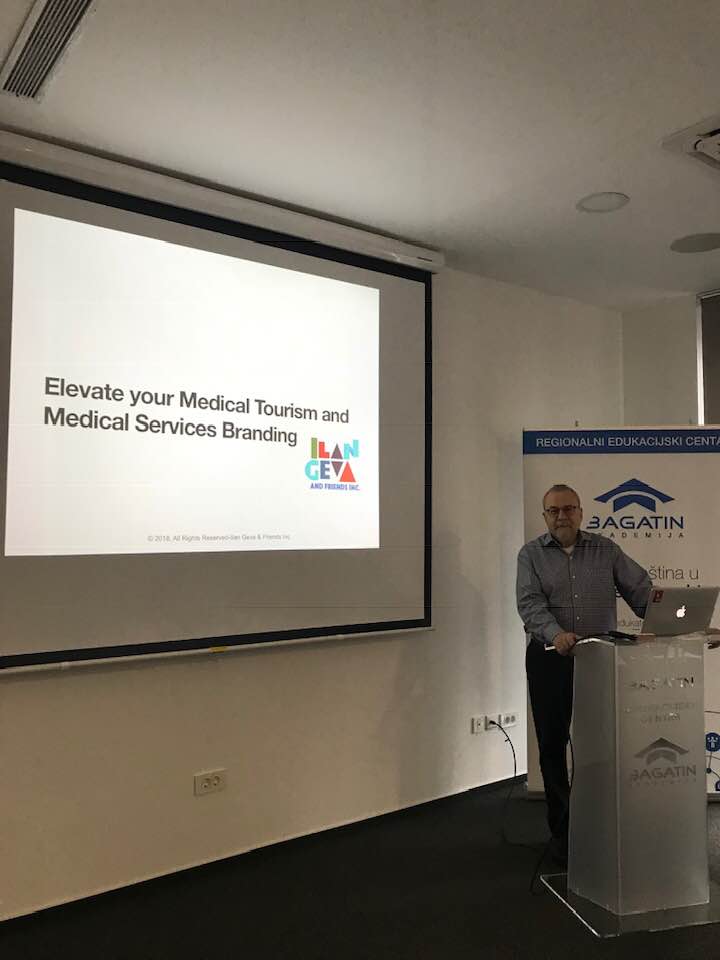
(Ilan Geva at the Bagatin Clinic Croatian branding workshop in Zagreb earlier this week)
"Tell us a little about the branding of Croatian medical tourism from an industry perspective, and how can it be improved," I asked the first panel from the audience.
"Croatia doesn't have a medical tourism brand. Period. I told you I am direct, but that is the truth. It has GREAT potential. It has some brilliant businesses such as Bagatin, which are doing incredible things, but private businesses cannot brand a country. The politicians need to provide the legislative framework for medical tourism to operate effectively. Then they need to set a budget. Then they need to get the hell out of the way and let the professionals deliver."
It was a theme echoed by Svjetlost's Ivan Grabic, whose frustration with the lack of national branding and promotion was not hard to detect. I asked him what he would do with a blank paper and pen and a mandate to deliver medical tourism in Croatia. He was extremely candid - and smart. Bring the clinics together to agree what they can offer. Then go to the government and involve the official stakeholders, for only the State can create a country brand, not a private company. Then agree a budget, which is where the fun begins. Gabric said that for every euro spent on marketing his eye clinic, he knows he will get 15-20 euro of business. Creating a Croatian medical tourism brand will not only take time to be successful (several years for France Surgery and the Malaysian Healthcare Travel Council), and so it will be seen as a shot in the dark with no immediate results. And that's where things break down with official cooperation and funding.
So the current state of the Croatian medical tourism industry, which has the potential to bring in BILLIONS to Croatia is this (from this Englishman's perspective):
1. The biggest brand for health care in Croatia does not mention Croatia - it is Kvarner health.
2. The biggest advocate of Croatian medical tourism is one private clinic in Zagreb (and soon in Split) - Bagatin.
3. Some of the best eye surgery (and probably the best for quality and price) in Europe is to be found in Zagreb and 6 other locations in the former Yugoslavia - Svjetlost.
4. There is a hospital in Zabok which is the exclusive partner of the world's best hospital, Mayo Clinic, on a new healthcare initiative - the OneOme RightMed pharmacogenetic test - which can save hundreds of thousands of lives a year and save hundreds of billions of dollars.
5. ALL the international medical tourism experts agree on the potential of health tourism in Croatia. And ALL the experts say the next step is for all the stakeholders to work together to make that happen.

Here is Sherene's slide on how Malaysia did it again - a reminder of how Malaysia did it.
In the front row at today's Kvarner Health cluster conference were senior representatives of the Ministry of Health, the Ministry of Tourism and the Croatian National Tourist Board - all key players.
Can Croatia do a Malaysia? Over to you, Croatia.
As for me, now I REALLY want to go and visit Malaysia... Learn more about the Malaysia Healthcare Medical Council here.
****
To follow the latest news regarding the Kvarner health cluster and medical tourism in Croatia in general, follow the TCN medical tourism tag.
For more on Kvarner health and the Crikvenica International Health Tourism Conference, click here.


